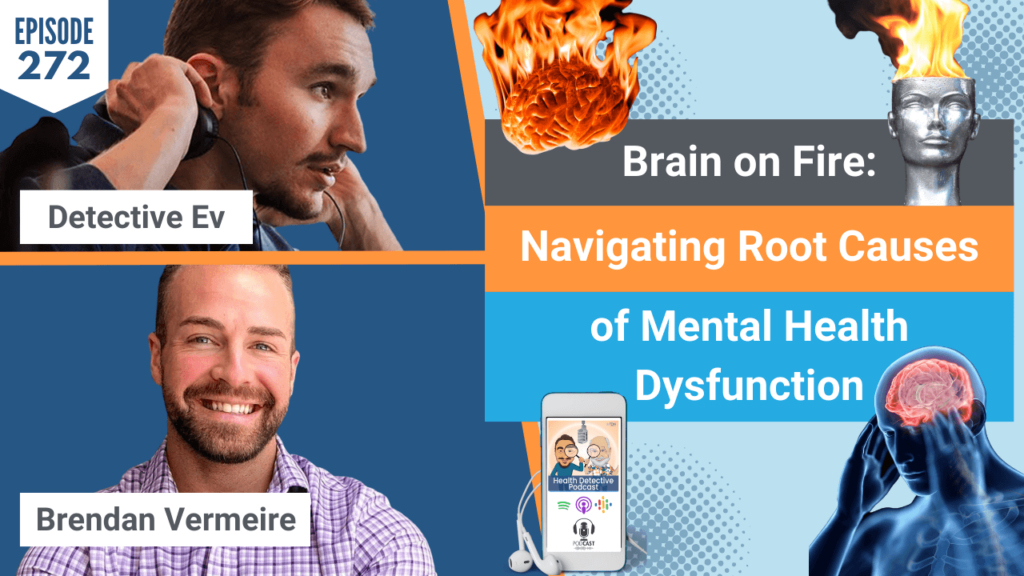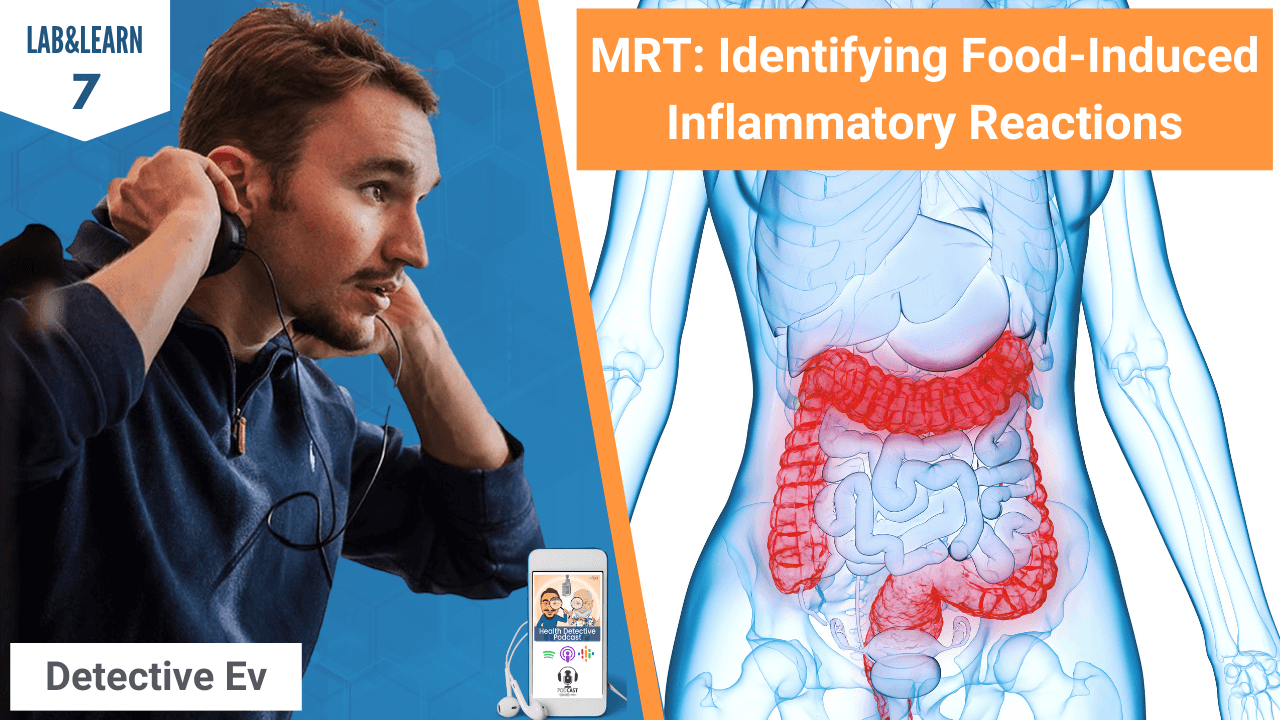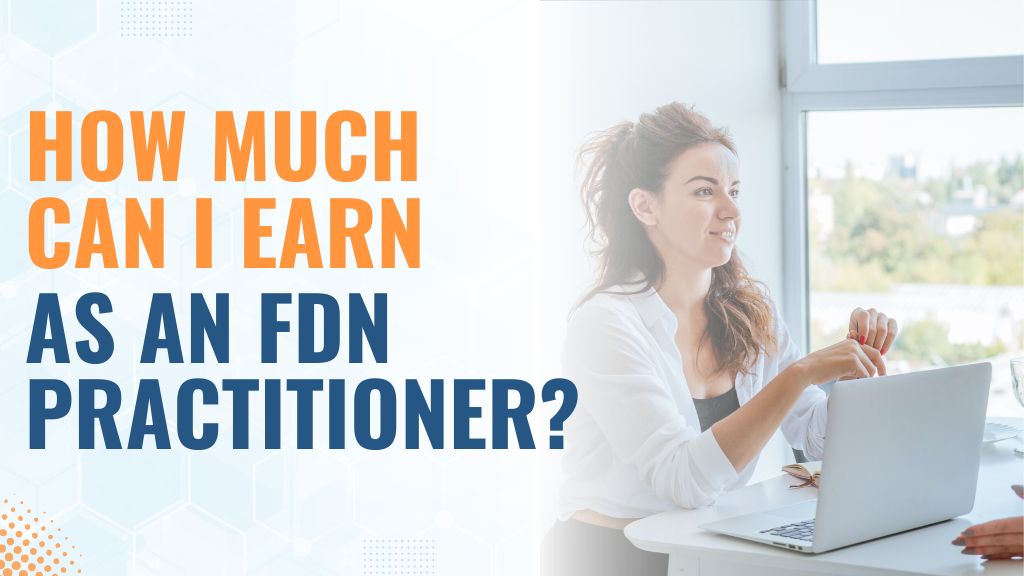Introduction
[00:00:00] Detective Ev: Hello everyone. Welcome back to another episode of the Health Detective Podcast. I didn’t check my episode numbers yet, but I think this is going to be episode number 272 with a really special guest, really cool guy, someone that’s been intimately involved with FDN in the past. He has taken this and like nine other certifications and ran with it to the 10th degree and is now making waves in the space exposing the brain on fire and quite frankly has been for a while.

One other really cool thing about you, Brendan, and it throws people off if they’re on video, because you’ve always looked like mature, right? You’re a big dude, you got the beard. But Brendan’s super young and has done this stuff at a really young age as well. It’s always cool to get to talk to someone that’s so passionate at a young age. Where’s this guy going to be in 15, 20 years if this is what 30 looks like, basically?
I’ll read his bio really quick, since we are live on video today. If you’re checking this out on audio and not aware yet that we are doing more lives on video, just make sure you’re tuned in with us on Facebook, YouTube. We’re going to get LinkedIn set up soon, but definitely YouTube and Facebook are the places to be.
We do announce these podcasts, so you’ll know when they’re coming out live and you can tune in with us. You can say, hey, ask questions, but as always, all of these things will still be released on our audio platforms where you guys all listen.
Brain on Fire: Metabolic Health & Functional Education
Brendan is a mental and metabolic health scientist and researcher, functional medicine educator, writer, and speaker. He is a board-certified holistic health practitioner, master nutrition coach, master personal trainer, USAW sports performance coach, and CrossFit trainer. He began his career as a personal trainer and nutrition coach at the age of 18 after disappointingly being medically discharged from the United States Navy SEAL training pipeline due to an injury.
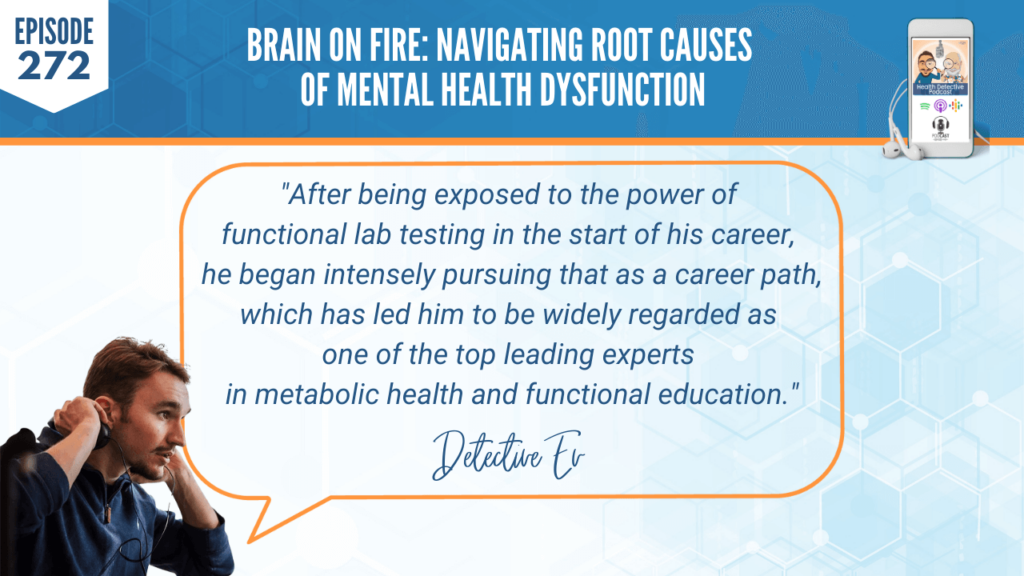
After being exposed to the power of functional lab testing in the start of his career, he began intensely pursuing that as a career path, which has led him to be widely regarded as one of the top leading experts in metabolic health and functional education. True. He is the proud owner and founder of the Metabolic Solutions Institute for Functional Health and Fitness Practitioners and the creator of the Functional Mental Health Practitioner Certification Course, (FMHP). Definitely excited to talk about that today.
He’s also the founder of the Metabolic Solutions Research and Education Foundation, a not-for-profit foundation dedicated to changing the way the world views mental health through advancing the science of mental health dysfunction. He is also the creator of the Mental M.A.P., a cutting-edge lab panel for mental health, and the NeuroCeuticals™ supplement line.
Last but not least, when he’s not educating doctors, practitioners, and professionals, helping clients overcome their most severe health struggles, or producing cutting edge scientific education, Brendan also enjoys all things fitness and is probably working out. He also enjoys anything in nature and any activities that expand his heart, mind, and soul.
My friend, welcome to the podcast.
Brain on Fire: Powerful Stories
[00:02:43] Brendan Vermeire: Thanks for having me, man. It’s a pleasure. And as we were saying backstage, you and I have been friends for a long time and have gotten to work together professionally. So, I’m just tickled that we have the opportunity to co-create some good stuff for the audience today.
[00:02:56] Detective Ev: It is really fun full circle.
When I was just getting started in the world of FDN, Brendan was already mentoring and stuff. So, that was fun. Then I got to work with Brandon Molle a lot too. And it’s so weird. This is the guy who got me through the course. It’s nice just getting to hang out with you guys on the flip side.
With that said, how we always start this podcast, and I know we can nerd out forever, but man, your story is so powerful. We definitely can’t go away from our normal script today, that’s for sure. We always ask what the people’s health challenges were because 99 percent of the people that have ever come on in all these episodes, they’ve been through stuff. That’s how you get into this space, right? No one sets out for this at five years old, basically.
So, Brendan, what were the first health symptoms that you dealt with and what did those things look like?

[00:03:36] Brendan Vermeire: I think you and I have a lot of overlap with the struggles that we had. And I think both being younger millennial men, I think there’s a lot of power to the stories that you and I can both share with many young men starting to struggle with mental health.
Brain on Fire: An SSRI at a Young Age
Of course, the mental health pandemic and epidemic doesn’t discriminate men, women, young people, old people. I’m sure we’ll get into some of the different statistics on neurodevelopmental disorders, mental health disorders, suicide, and neurodegeneration, but it’s just really reached crisis points.
Although the largest growing demographic of consumers of neuropsychiatric drugs are young men, that’s the demographic that seems to be overlooked and may be suffering in a lot of ways. And I think you and I contributed to some of those statistics. I know there’s a number of statistics I’ve directly contributed to myself. So, it gets weirder and almost harder for me to even tell some of my story because there’s the very long, painful version and I’ve gotten good at consolidating into like succinct cliff notes.
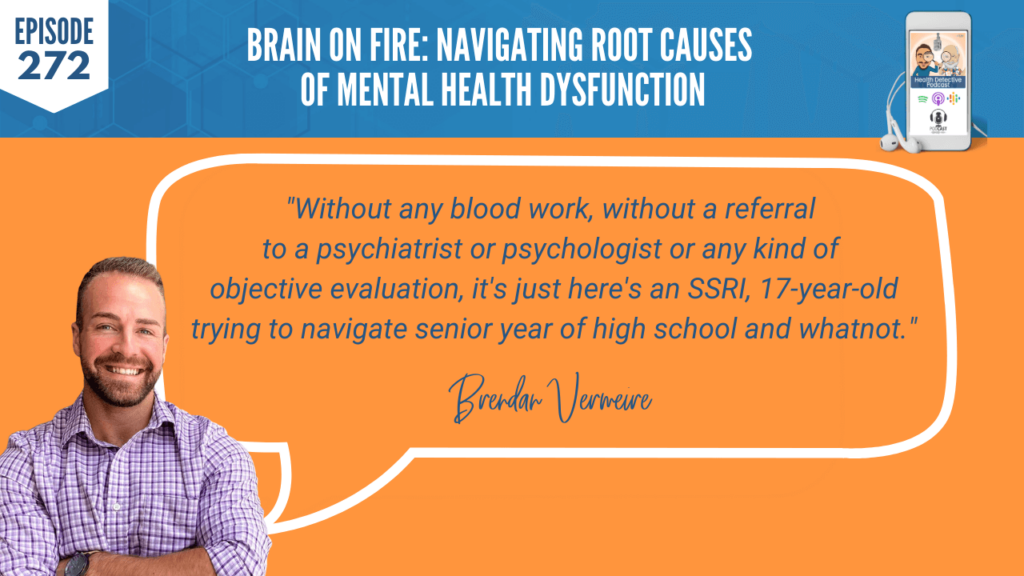
I was first put on a neuropsychiatric drug at the age of 17. I was just doing a physical for athletic participation purposes and for wrestling season and mentioned that I struggle with some depressive kind of seasonal effective stuff. So, without any blood work, without a referral to a psychiatrist or psychologist or any kind of objective evaluation, it’s just here’s an SSRI, 17-year-old trying to navigate senior year of high school and whatnot.
SSRIs didn’t work well for me. Now they have all the stern black box warnings of sexual dysfunction or increased suicidal ideation, but they still get dispensed like Halloween candy. So, that’s like 17. As you read in my bio, age of 18, I signed a six-year Navy SEAL contract and signed away my life to the United States Navy for the SEAL program, but I was medically discharged from a preexisting injury.
Brain on Fire: Intensive Care
That was like my life dream and my sense of purpose, which is very important for mental health (clinical pearl) getting taken away from me. So, that sort of put me in a bad place of like, all right, I just lost my life dream that I’ve been working for many years.
Becoming a fitness health professional was always like a fallback. I was very passionate about fitness, health, nutrition, and optimizing performance. So, I was at this crossroads of either go to college or do the college kid thing, which didn’t resonate with me. It’s just not who I am, jumping through the hoops of academia.
And Rick Sanchez, who’s the smartest man in the universe, he always says that school is not a place for smart people. So, I subscribed to that ideology. But it wasn’t until I was 21, I was actually back in front of my physician, I think for another physical, and similar reports of like still struggling with mental health.
Now, by this point, I had already been a certified personal trainer and nutrition coach for three years and had three years of professional experience, and even though extremely fit and metabolically healthy, still struggling very much psychoemotionally and mentally. Then this time I got put on a dopamine drug. And this time, because of the history, I was actually referred to a clinical psychology clinic.

I underwent formal neuropsychiatric evaluation and was diagnosed with major depressive disorder and ADHD. It was actually two weeks later, I woke up breathing out of a tube in the intensive care unit because I chose to overdose on the dopamine agonist, Wellbutrin or Bupropion. There were a lot of other things going on.
Brain on Fire: A Toxic Relationship
I was in the beginning of what turned out to be the most traumatic thing. And I hate how much the word trauma gets overused these days. It’s been very appropriated. But easily this relationship that was a very toxic sort of prototypical narcissist empath kind of dynamic, again, I know that gets overused these days, but that’s what I was in.
I was cheated on, lied to, manipulated, emotionally abused, and it was an extremely traumatic relationship. It was actually trying to save this woman that I was engaged to, who had three children, it was trying to save her that got me into functional medicine, FDN.
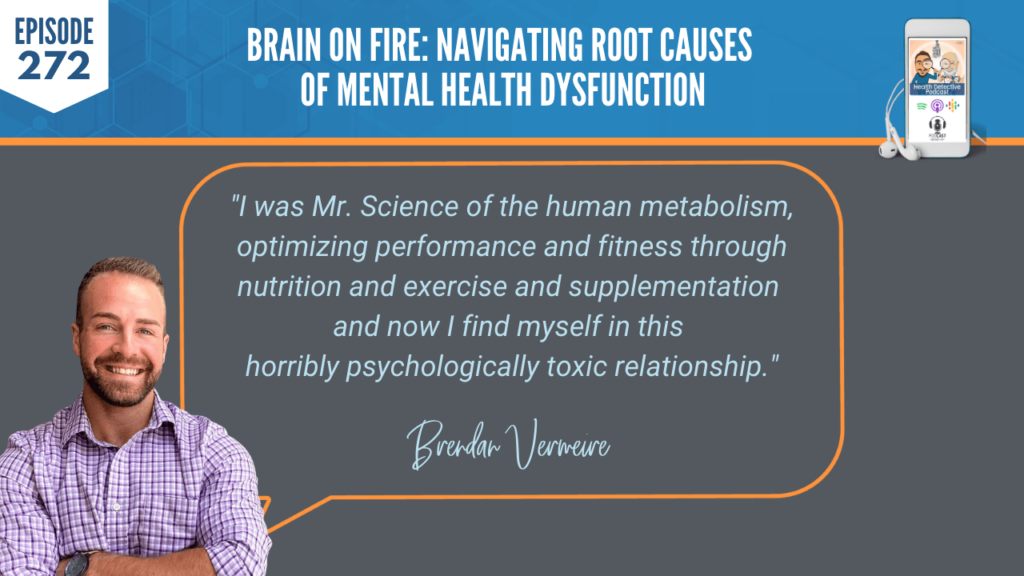
Just to speed up this story a little bit, because this is the hook and puts me on the trajectory to understand how I got to where I am today. I was Mr. Science of the human metabolism, optimizing performance and fitness through nutrition and exercise and supplementation and now I find myself in this horribly psychologically toxic relationship. But I was very in love with this person, and she got this mysterious illness. It was her mysterious illness, where her demeanor, her aura completely changed – a lot of neuropsychiatric changes and volatile behavior, a lot of neurological symptoms, peripheral neuropathy, numbness, tingling, stabbing, ice pick pain that kind of was moving throughout her body. There were a lot of things going on.
And as far as some of the root causes of her, she had a lot of unresolved childhood trauma. She had suffered a lot of concussions from cheerleading and stunting, getting dropped on her head. We lived in a water damaged, musty home. It was a really stressful life with her three children from two different kind of deadbeat fathers. Life was hard.
Brain on Fire: Self-Education & Self-Healing
She was literally bedridden, would get out of bed to do her job, take care of her three kids. And then I was trying to support her and the three kids hustling as personal trainer while being emotionally abused and manipulated in this relationship.
The point being, it was trying to save her that I started diving deeper into root cause medicine. Because we had been to the medical doctor who ran blood work on her – can’t find anything wrong with you. Blood work looks normal; maybe it’s all in your head.
So, we tried chiropractic, we tried naturopathic medicine, we tried physical therapy we tried all these things. We were doing our own research, doing parasite cleanses, diving into methylation. Being the science health professional dude that I was, I took it upon myself to try to save her. And ultimately, that’s what steered me into studying functional medicine and a lot of psychology because I was trying to navigate what the heck is going on in this relationship.
Ultimately over the course of time, I managed to get out of that toxic situation. She ended up taking her life in 2020, leaving behind her three kids. I don’t know. In a lot of ways, I always like to say my work is my medicine. The career that I have built has been the thing that has saved me, and it gives me a sense of purpose.

I have managed to heal a lot of my own issues through my learning and my education and importantly, my service to others. So, in a lot of ways it’s a blessing and a curse. My work is my medicine and that’s a little bit of what has helped steer me to where I am today.
Brain on Fire: Work That is Medicine
[00:10:52] Detective Ev: Thank you. As someone who knows the story overall pretty well, we’ve gone in depth with it before. I’ve went through one of your courses and you’re very transparent about things there; I think that’s a perfect summary. It highlights a lot of the main things. You did have your own unique struggles, but also, you’re dealing with another human being that has their very own unique struggles.
I loved in particular about what you just said, because I don’t think I’ve heard it worded this way, is the work and career as the medicine. And I could not relate to that anymore. It’s almost as if, if I didn’t have this, I don’t know where I’d be. And some people would argue against what we just said, actually.
Some people would say you don’t want any external thing to be that validating thing or medicinal in that way. And I don’t think you and I literally rely on it. I think it could be taken away and we’re at peace now. We’ll figure it out.
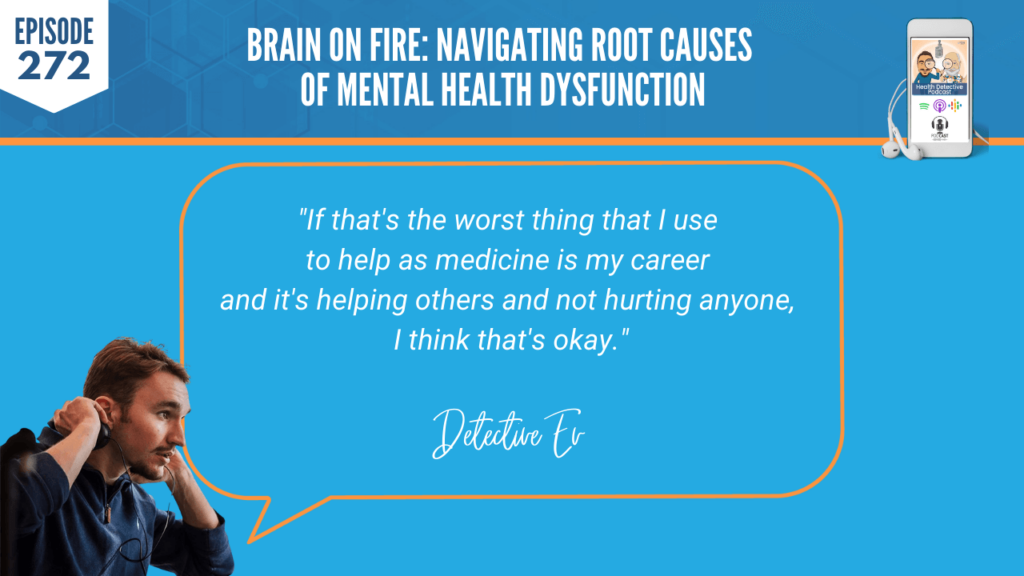
But man, you know what, of all the things to argue and debate, that one, I’m just going to say, dude, who cares. If that’s the worst thing that I use to help as medicine is my career and it’s helping others and not hurting anyone, I think that’s okay. I think there’s worse crutches out there that we could possibly have. Also, I find it interesting because this is something men don’t talk about very often, but I feel like the story is very common in its own way.
Brain on Fire: Growing Pains
It’s unique to everyone, but common in its own way where we have an experience, usually the first person that we ever really loved. And it’s probably not an ideal relationship for one reason or the other. Every now and then you hear the high school sweetheart thing. It’s pretty dang rare in our generation. But that has a profound impact.
And so, just like you, you’re trying to help this person and that’s what created this amazing passion and all these cool things that you’ve done and are still doing. I was in a similar boat, except I was the bad person, right? I was acting crazy with all this stuff. And I’m not really politically correct. I try to be a little more politically correct with the mental health stuff because it wasn’t crazy in a literal sense. It was just not me.
I’m dealing with some serious stuff, abusing drugs, not acting the way I normally would. But it was actually because of how bad I hurt that person, not physically, but hurt that person in the relationship mentally and emotionally that was my wake-up moment where I’m like, dude, you got to go figure this crap out. So, I was almost interestingly in this opposite boat, but a very similar thing where I’m the negative person. I need to fix this to hopefully mend this.

Now it doesn’t work out that way and I don’t know that it’s supposed to necessarily. I think these are the growing pains that occur when you’re pursuing that.
Brain on Fire: Imposter Syndrome
But the work is medicine thing, I couldn’t agree with more. All those speeches with kids, I always make a joke that they gave me more that day than I’ve ever given anyone else in a speech. And interestingly, with all the stuff you’ve done, you might say something similar.
With that said, all that story and that background, it’s one thing to take the pain and put it into purpose, you have taken this and put it into obsession, man. And one part of that is you’re very intelligent. Maybe you can consume information faster than others. But this isn’t a person, guys, where you got one certification or two certifications, then stopped. This has become lifelong learning, a dedication to it, legitimate research, legitimate funding for studies and trying to work things out.
I don’t want to jump too far ahead into just present day. I guess I want to fill in the gaps here a little bit. Roughly speaking, how many certification programs have you done, time studying? I really want people to understand the depth of what you’ve done in terms of your knowledge.
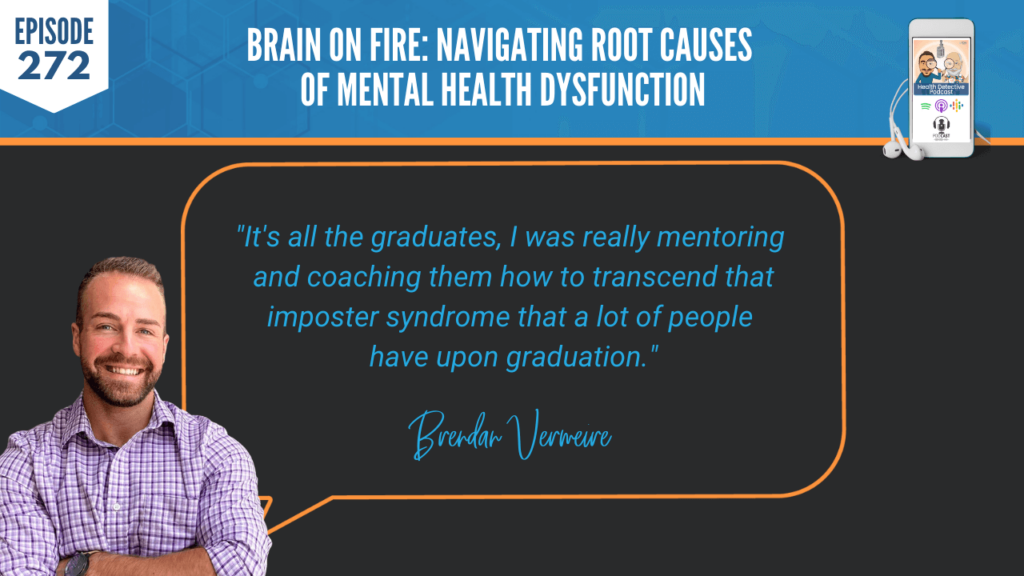
[00:13:59] Brendan Vermeire: I like that you’re giving me the opportunity to speak to that. Cause I think everybody struggles with imposter syndrome, right? Gosh, I was a mentor for FDN for how many years? And it’s all the graduates, I was really mentoring and coaching them how to transcend that imposter syndrome that a lot of people have upon graduation. Do I have enough knowledge and or experience to help somebody else with their health and with their healing and everything?
Brain on Fire: The Scientific Literature
There are definitely moments where it’s, am I qualified to be doing what I’m doing? And yet I look at it the other way. It’s, I am the most qualified to be doing what I’m doing and nobody else is really doing what I’m doing. I think what I’ve built is unique.
I was in college, I was working full time and going to school full time. And I knew that essentially, what I knew I wanted to do was help people reach their health goals using lab testing and science. The company I was working for, they had a lab testing program, big corporation, billion-dollar company, but they required you to be a licensed dietitian.
So, there for a while, I was looking into dietetics or clinical nutrition. Medical school, like conventional medical school didn’t really resonate. I didn’t want to be a part of the conventional healthcare model. Naturopathic was attractive to me, but it felt like it was missing the fitness, the nutrition, the metabolic, it was a little bit too woo and Chinese and acupuncture and herbs. I’m like, no, lift weights, drink protein shakes, eat really clean, and use lab testing to objectively qualify progress.

It was when I was going through those tumultuous times, I don’t even know how many certificate programs I’ve been through. So many, right? Precision Nutrition Level 2, USAW Sports Performance Coach, CrossFit, NASM, FDN, all the things, so many others that are not even really well recognized, advanced mentorships. But honestly, the best education I feel like I’ve gotten was my own just self-research. I got to a point where I was just like, I’m tired of, I’m going to take this person’s word for it or that person’s word for it. What does the scientific literature say?
Brain on Fire: A New Type of Mental Health Professional
So, I really just started diving deep into the scientific literature. And this is where our whole industry claims to be very evidence based, but a lot of times I see a lack of citations.
Whereas like most of my slide decks, I just finished a gut/brain axis course that was like over 400 slides, hundreds of citations, hundreds of excerpts. Because there’s a wealth of scientific literature that’s sitting there at all of our fingertips. So, for me, I felt like I didn’t have, for one thing, ADHD, being its own sort of phenotype of that’s not how I learn. I’m very much autodidactic and self taught in a lot of ways. Felt like I didn’t have time.
And somebody that really inspires me is Paul Stamets where he’s become the most famous, respected mycologist in the world. He doesn’t have a traditional Mycology PhD, academia background, and yet he’s managed to become the most famous and well-respected mycologist.
To me, it’s interesting, there’s a lot of socioeconomic things too. I think young people are struggling to be able to actually put themselves through college, get a paying job, pay off their college debt. That business model is actually failing right now as the economy is failing right now too.
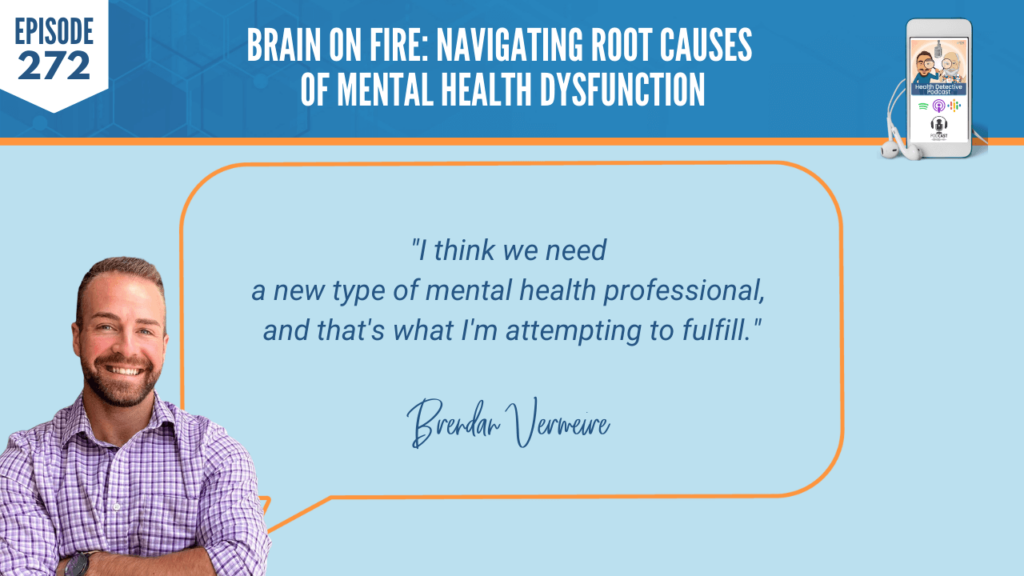
So, there’s a lot of factors, but ultimately, I’m proud of the path that I’ve walked in and feel good about the education I’ve put myself through, the experience and real-life experience I’ve gained. And that’s why it’s really fulfilling for me to be bringing this FMHP thing to the world, because I think it’s very needed. I think we need a new type of mental health professional, and that’s what I’m attempting to fulfill.
Brain on Fire: Irrefragably Certain
[00:17:55] Detective Ev: I think it’s going to be a perfect transition because you actually hit on one thing that I was hoping we’d get to – the time spent. And that’s something I noticed about you from pretty much day one because you were constantly referencing this.
It’s, I actually read scientific literature. I actually go into the studies and dissect this and figure out what’s useful and what’s not. We do need more of that, full transparency. And it’s a shame because that’s not as sexy, right? We just want, even in the functional medicine space, we want these quick fixes or the supplement for that or something that sounds good.

But even at FDN, we have an advanced course now called Scientific Literacy so people can learn to read this. And how many people really go through it, right? I don’t think it’s our most popular advanced course, I’ll put it that way. But I think one thing that excites me about this mindset and philosophy and actually basing it in science is it’s pretty hard to argue someone that can cite a hundred different things in their slide deck, right?
Because Brendan, for example, for you guys that don’t know, he’s lectured two doctors without a college degree before the age of 30. How do you do that? If you can back up what you’re saying with research, yes, you could go do that.
It’s funny because it is tough. I think it’s a learning curve. I’m not an expert in it by any means. I don’t think it’s an unobtainable thing for most people that are even mildly intelligent. You can figure this out, but we just don’t think about it because it’s not sexy.
Brain on Fire: The Prerequisite
It’s not fun to go (define fun, right?), to go through PubMed or whatever it might be. It’s fun if you get what you’re looking for, but you got to back this stuff up and you got to understand. What’s really cool about your things that you’ve created is not only is it probably this wonderful mix of all these different certifications, fine, but it’s actual databased research that makes sense and that we can rely on.
So, I’d love to talk about this mental health program now. This is actually something that people could go through if you’re an FDN practitioner, if you’re not an FDN practitioner, someone could just go through this. You don’t have to have any prerequisites, is that correct?
[00:19:45] Brendan Vermeire: Yeah, technically. With the time that I spent with FDN and the relationship I have, it was a very organic evolution of the FDN model and the FMHP model is the same blueprint, but it’s a completely different curriculum. So, my ideal student would be somebody that just graduated from FDN, is wanting to really take their skills/knowledge to another level and specialize in this mental health and kind of neuroinflammatory realm.
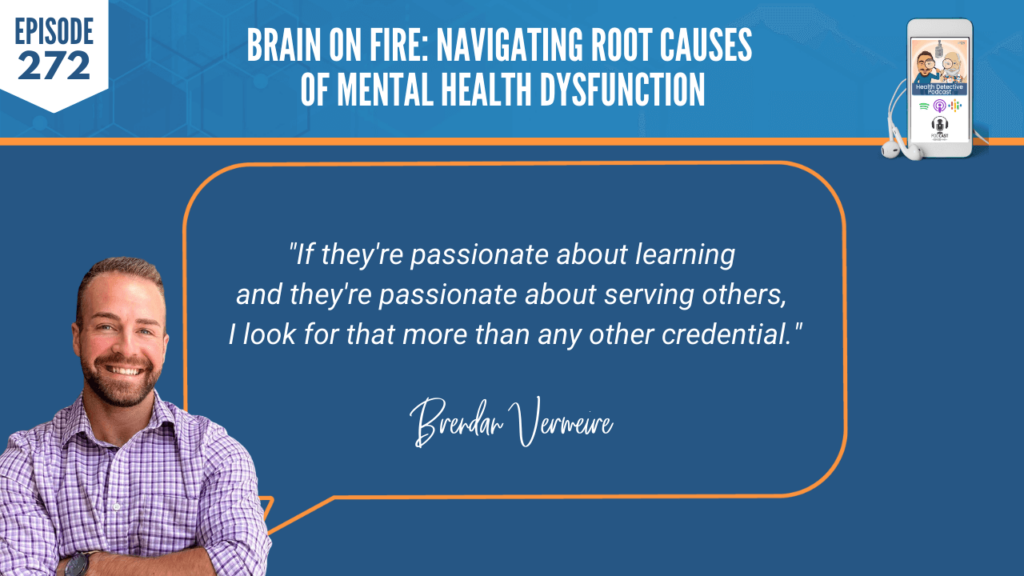
But technically, I, above all else, especially considering I don’t have a college degree, I look for the desire to serve and the desire and passion to learn. If they’re passionate about learning and they’re passionate about serving others, I look for that more than any other credential. So, I technically do not require prerequisites.
But with the growing community that we have, we’ve been getting a lot of therapists, for example, cause obviously they’re mental health professionals that do talk therapy and they’re wanting to integrate more holistic, functional root cause ideology into that.
Brain on Fire: A Needed Combination
Therapist kind of struggle a little bit just because they don’t have that like hard science, the metabolic physiology, cellular biology. Anybody that has a strong understanding of just essentially physiology and metabolic health sciences, it’s going to be easier to pick up because the course is extremely dense and technical, for sure.
[00:21:14] Detective Ev: Okay. So, I’ve been through one of Brendan’s other things that I can 100 percent guarantee you will get dense and technical in these things. If you love science and really love it, it’s a good place to go. And it’s cool because you do learn a fricking lot.
I think some of the most profound things I’ve ever taken from your one course in particular was the fact that, as technical as you get and as deep of an understanding as one can obtain from going through it, you still always bring the people going through the course back to the fundamentals. It’s, you get to bed on time, man, eat real food. Let’s start here, let’s do this stuff.
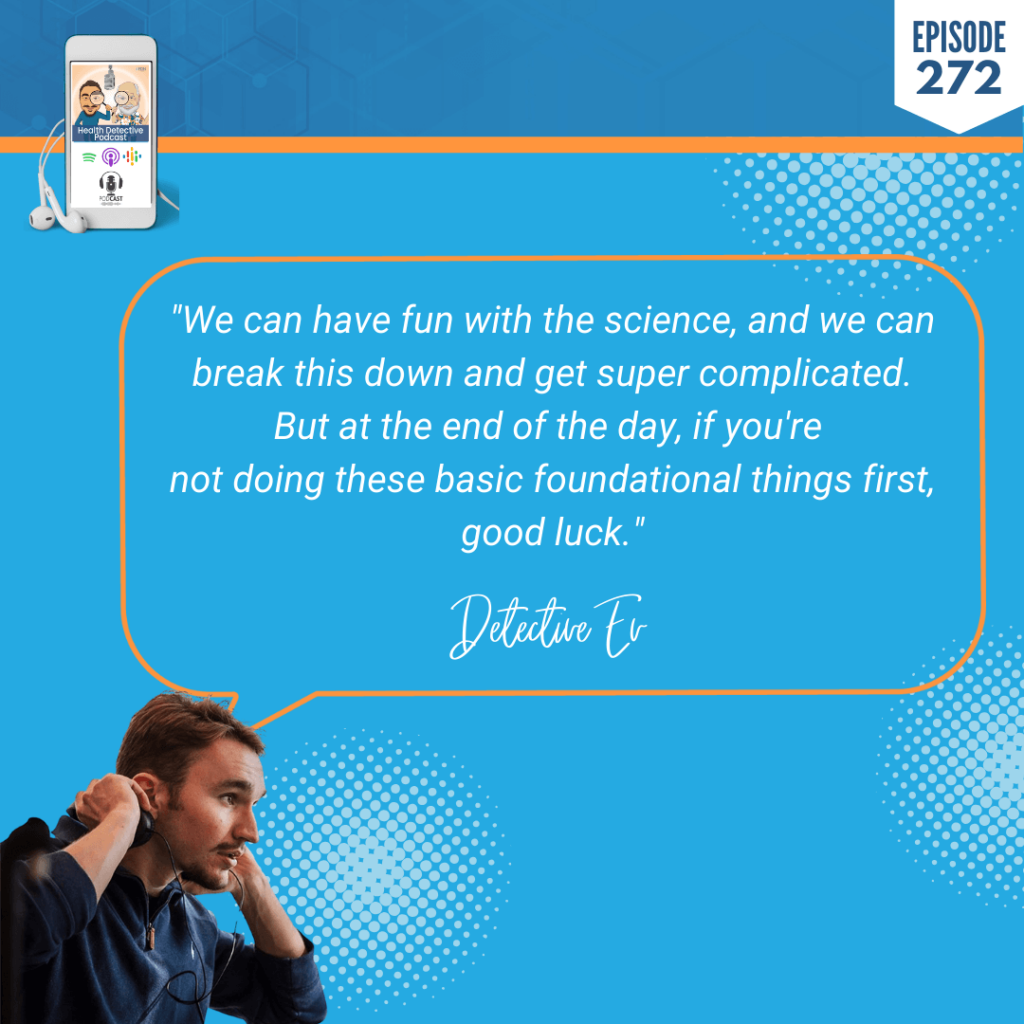
We can have fun with the science, and we can break this down and get super complicated. But at the end of the day, if you’re not doing these basic foundational things first, good luck. You’re just doing Western medicine with supplements basically. You need to be able to do both.
All right, just like FDN then, there’s no prereqs, especially in your case though, because I would imagine it’s even more dense in terms of the technical science. It wouldn’t hurt to have maybe a little background or interest in some of these things probably to go through. But I appreciate that – if you have the passion and willingness to serve, I think you can get through these things.
Brain on Fire: Functional Medicine for Mental Health
It was very tough for me going through FDN in the beginning. I went through fast, but it was tough. So, I didn’t have a background in this stuff, but I had that passion. See, I wanted to serve, and it allowed me to get through.
Let’s break down the curriculum. Obviously, it’s for someone who would be very interested in serving people with the mental health stuff. What will I learn if I go through this program? How’s it broken down?
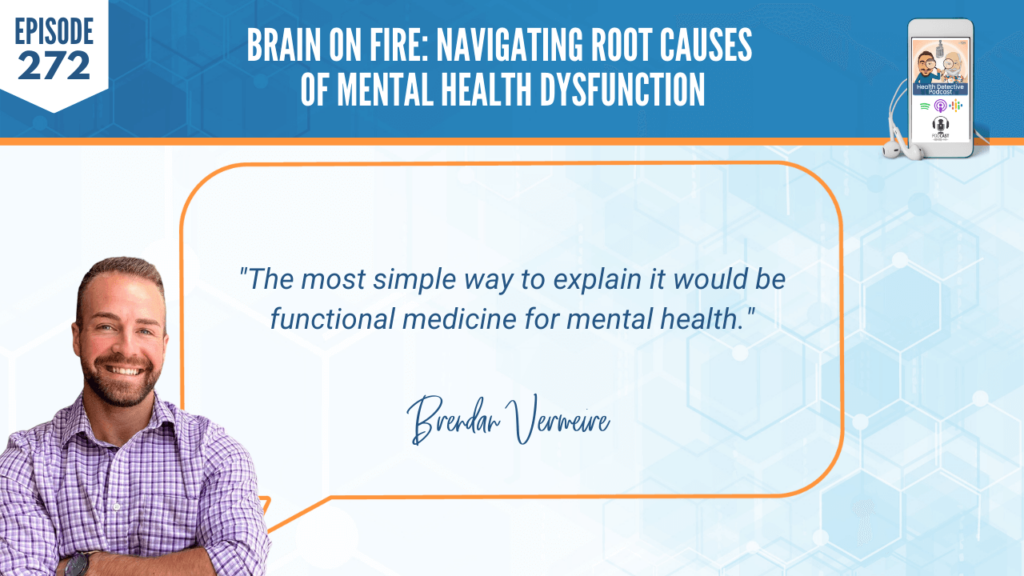
[00:22:36] Brendan Vermeire: The most simple way to explain it would be functional medicine for mental health. Although I think that’s just easier to understand, I feel like that’s devaluing what it really is. In my opinion, it’s a lot more.
When I came into the functional medicine space and was doing my rounds, especially with my background of fitness, nutrition, metabolic physiology, to me, using exercise, movement, nutrition as medicine, it’s just common sense. It’s intuition.
As a personal trainer and nutrition coach back in the day, I was like, this is great. I want to help people on a deeper level. And sure, I saw over and over, client after client, maybe they come in for the scheduled workout, but they stay because of the life coaching and the psychological coaching that they’re getting out of it.
When you have clients that are reporting, yeah, I went to my doctor and my blood work looks better than ever. And especially one of the things that got me hooked on the lab testing was I really like objectivity. For me, my spiritual practice is just as important as my scientific work and pursuits. I look at my spiritual practice, that is my subjective pursuit of truth. And my scientific work is the objective pursuit of truth.
Brain on Fire: Lack of Foundations
I like to keep my head in the clouds and feet on the ground rooted in evidence. And when I look at the functional medicine industry, I still think it’s way to pill based. I think there’s a lack of effective client centered coaching. I see so much theory and not enough evidence to back it up, some of the common practices and common sort of narratives that people say all the time.
What I’m noticing, my friend, is this increasing growing demographic of practitioners, coaches, self-healers, clients, patients that are way excessively complicating health. That’s something I’ve always loved about Reed and the FDN program was bringing it back to the foundations – the DRESS for Health Success, diet, rest, exercise, stress reduction, supplementation.
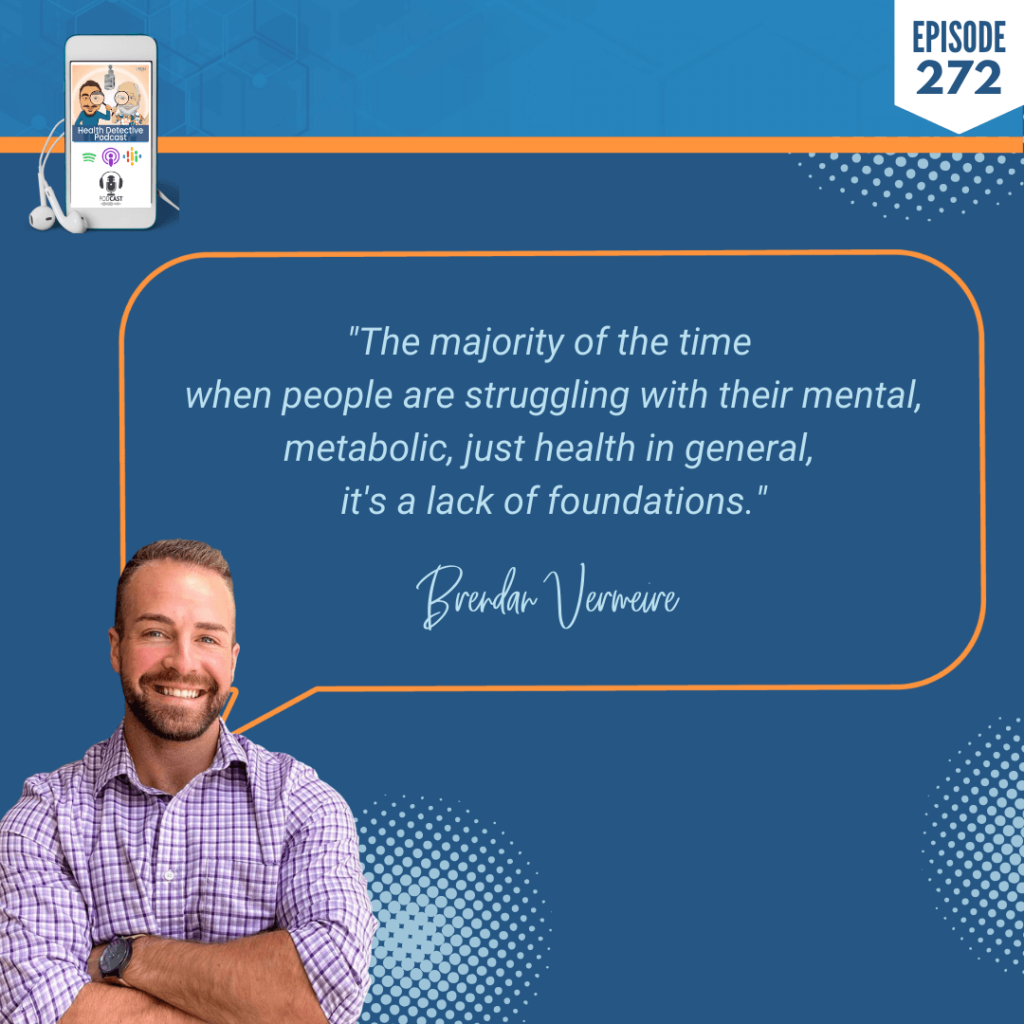
The majority of the time when people are struggling with their mental, metabolic, just health in general, it’s a lack of foundations. It’s a lack of integrity with the foundations of their lifestyle. Yet they get put on this sort of hamster wheel of, you haven’t done this test yet, you haven’t done that protocol yet, you need to open the lymph, do the drainage, bind the this, deactivate the mast cells, and what’s your mitochondria cell danger response. It’s a lot of hypotheticals. It’s a lot of theoretical and it’s not rooted in objective data.
So, I’m always bringing people back to what is your reliable objective data with the lab testing and specific clinical biomarkers that are well validated through mountains of published literature. That way we have this objective framework to start doing that self-experimentation. We can be doing, what are you lacking in your life and how can we intervene upon that, whether it’s more psychological intervention, whether it’s supplemental, whether you want to do pharmaceuticals with the doctor.
Brain on Fire: The Nocebo Effect
A huge part of what I do with the FMHP program is creating that framework for success. We’re using the rigors of clinical testing and biomarkers and literature, but combined with client centered coaching, psychology.
For example, to illustrate that point, I think the nocebo effect is one of the biggest root causes that nobody’s talking about. We’re all familiar with placebo. We all have recognized, yeah, placebo, that’s a real thing where if you take a pill that could be an empty capsule, but if you expect it to have a positive impact on your health, you are very likely to experience positive health effects, even if there was nothing in that capsule. That’s placebo.
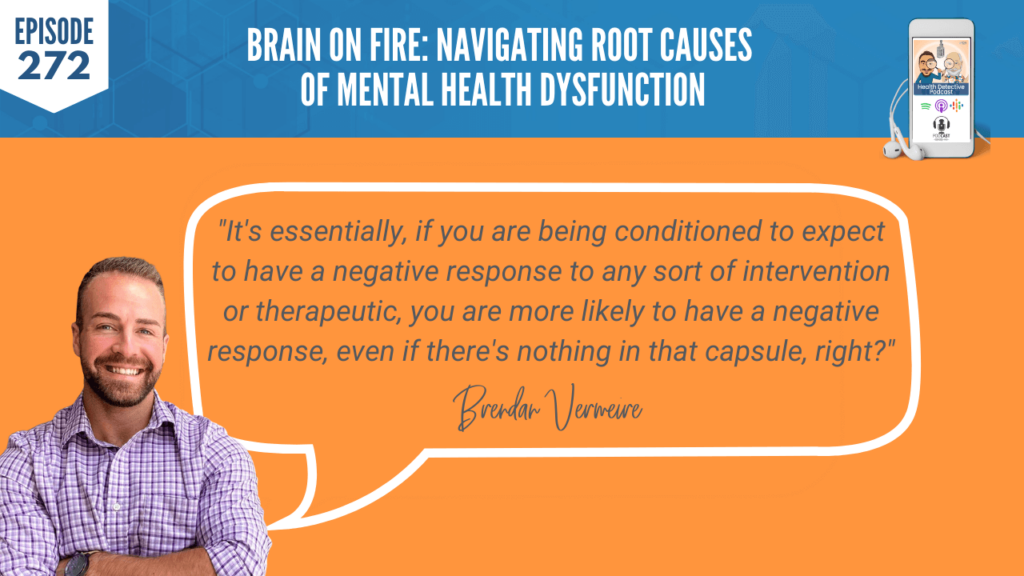
Nocebo is the exact opposite. It’s essentially, if you are being conditioned to expect to have a negative response to any sort of intervention or therapeutic, you are more likely to have a negative response, even if there’s nothing in that capsule, right?
So, what would happen if you run a bunch of experimental functional lab testing and you tell a client, oh gosh, even though you went to your doctor and your doctor said your blood work looks fine and there’s nothing wrong with you and it’s all in your head, you’re on a neuropsychiatric drug to help you feel better, actually, we see that you have mold illness based on this mycotoxin test. And you have a leaky gut and HP axis dysfunction, mitochondrial dysfunction, estrogen dominance, and all of these things, right?
What are you conditioning? You’re conditioning them to think – there’s so many things wrong with me and my mast cells are activated. My cell danger response and my mycotoxicosis, I’ll never get better. All the while, none of those parameters are testing their physiology.
Brain on Fire: Letting Go
So, they’re going to start experiencing negative effects because you’ve conditioned their brain to do that. We have to bust out of that while also systematically looking at what’s going on in their physiological systems and how do we best support that holistically?
[00:27:41] Detective Ev: I don’t know that I would have been able to word it as well, but it was a phenomenon I noticed in myself actually several years back where so many things were really good. And I was noticing that certain foods we’re still breaking me out. Cystic acne was a part of my story. I wish I had tracked this a little better so that I could (not that it would be fantastic data), but at least so I could give, hey, I did this, and it led to this.
There was almost just a letting go period, I think very mental and emotional, which ironically came during the pandemic. It’s bad in a sense, but it felt so hopeless at times that I was almost like, dude, who cares about all this crap that I’m worrying about health wise. There’s bigger problems, bigger fish to fry right now.
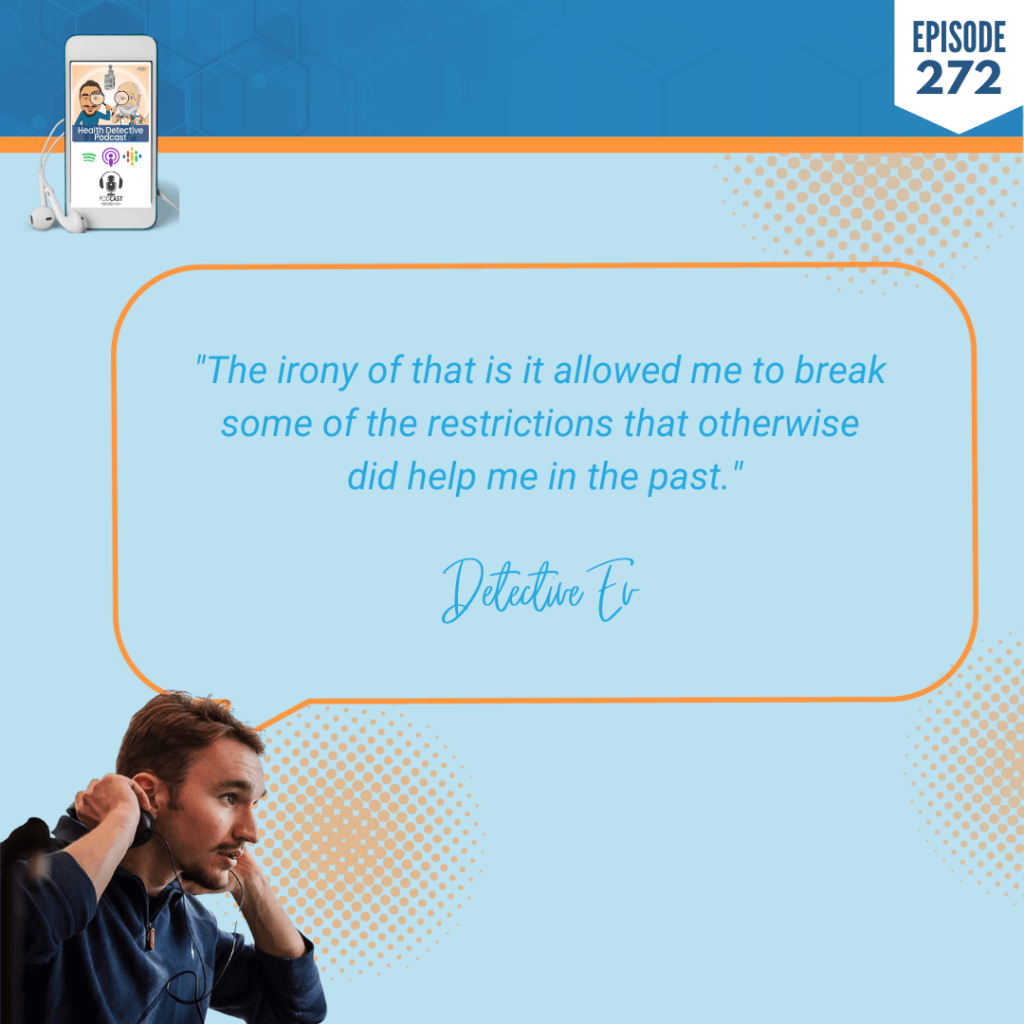
But the irony of that is it allowed me to break some of the restrictions that otherwise did help me in the past. That was real. When I was at my sickest, it did help, but I didn’t need them anymore. I didn’t need to not eat this food or never stay up past 9:30, otherwise, the world’s going to collapse. When I was at my sickest, it did help. That is true. And I know that for a fact.
Brain on Fire: A Trauma Response
I think I’ve seen this where it gets maintained for way longer than it needs to be. And it’s hard for someone to register (and I speak for myself at least), that, okay, I’m eating this food. (This is nocebo to a “T”. It’s with the food in this case.) Oh, this is going to break me out. And sure as crap, it does.
But then what was happening, Brendan, when I was a little more open to eating out at certain restaurants and stuff, I would realize, after the fact, that I was getting exposed to those foods that broke me out, but I didn’t know I ate it, and it didn’t break me out. It was like, oh, okay. So, there’s only one difference here and it’s my perception about what’s going on.
I’ve never heard that theory that’s being under talked about, but I would agree with you now that you’ve said it. I think this is happening a lot. So, I looked at it as more like these neurotic tendencies going on way too long. It’s things that, yes, were very useful at one point. Cause you do, Mr./Mrs. So-and-So, you got five different diagnoses: you’re like dying. You can’t get out of bed. I get it. We might need to tighten things up for a little bit.
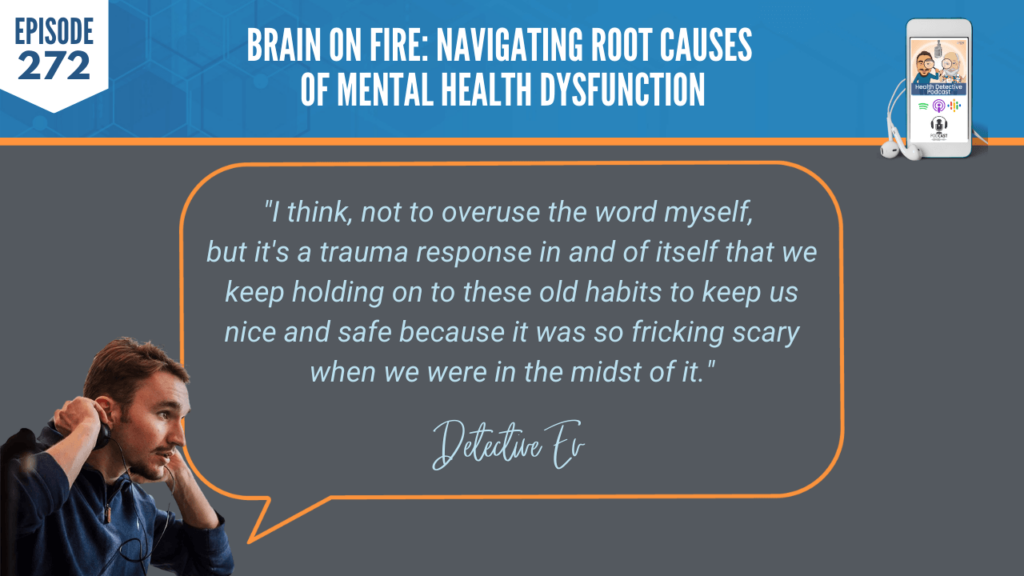
But it’s dude, you’re good, man. You’ve been good for a while. And I think, not to overuse the word myself, but it’s a trauma response in and of itself that we keep holding on to these old habits to keep us nice and safe because it was so fricking scary when we were in the midst of it. But dude, isn’t the point to heal? Isn’t the point to let some of this go eventually.
Brain on Fire: Module One
And it’s been amazing to find as I’ve let some of this stuff go, the amount of things I can, all of a sudden, enjoy and eat. Like, I didn’t eat dairy for years. Dairy does actually really well with me it seems, at least so far. I don’t have anything objective to back up that it’s something I’m reacting to, and I can enjoy it in my diet again. Not for everyone, but totally fine for me. And I restricted it for six, seven years because it was so bad for me. It always affected me. It’s interesting how that goes.
Although I loved what you said, I still think maybe it’s worth dissecting a little more how things are broken up in your specific curriculum for your program. I know something that you post about a lot is like the neuro inflammation aspect. I’m assuming people get to learn about that. So, I’m just using a basic example. But if we had to break it down into some sections what can someone expect if they get to go through your program to learn?
[00:30:40] Brendan Vermeire: I’ll rattle off the overview of the curriculum, the outline, just give people more specific tangible idea.
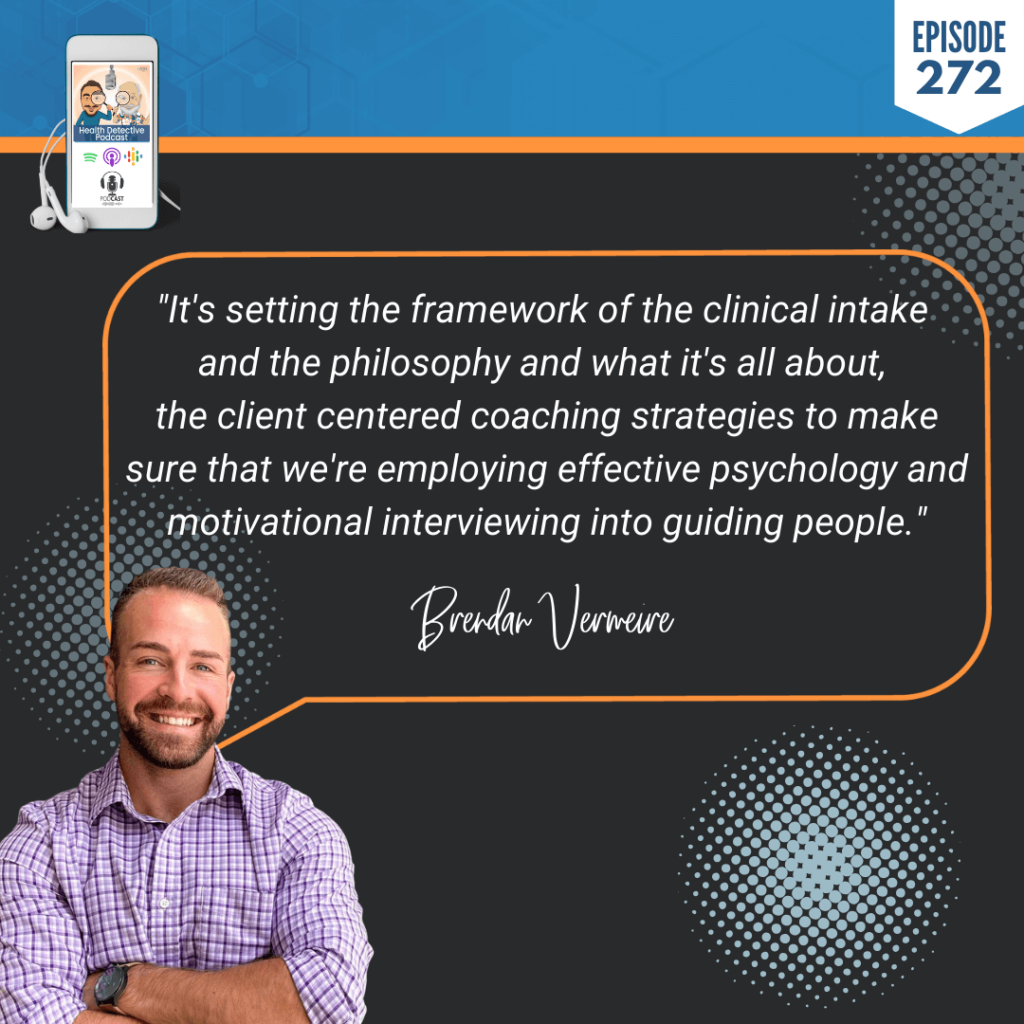
Module one is setting the stage. It’s setting the framework of the clinical intake and the philosophy and what it’s all about, the client centered coaching strategies to make sure that we’re employing effective psychology and motivational interviewing into guiding people. Cause if we’re coaches and practitioners, at the end of the day, all we can do is talk at somebody to try to educate and empower them and motivate them and guide them through the obstacles that they will have to overcome to reach their goals.
Brain on Fire: Module Two
Module two is where things get intense. It’s like a 40-hour module. Even some of the doctors in the program are drowning in it because we dive deep into the subjects of brain inflammation or neuroinflammation, neuroplasticity, or how the brain rewires itself, thoughts become proteins and a phrase that I coined called microglial activation syndrome.
The point being, module two is really what sets the stage for the rest of the program, because we’re really studying neurophysiology and understanding this homeostatic equilibrium between this neurodestructive, neurodegenerative, neuroinflammation phenotype that occurs when there’s too much microglial activation, too much fire burning in the brain.
Why do we see that Alzheimer’s is the sixth leading cause of death for Americans? What is that? It’s chronic neuroinflammation, right? The chronic inflammatory, chronic disease crisis is driving just excessive degeneration of the brain. It starts in utero. It starts with the mother’s immune system, the mother’s microbiome. That’s why we see autism at 1 in 36. It’s a neurodevelopmental disorder that turns into a mental health disorder that turns into a neurodegenerative disorder.
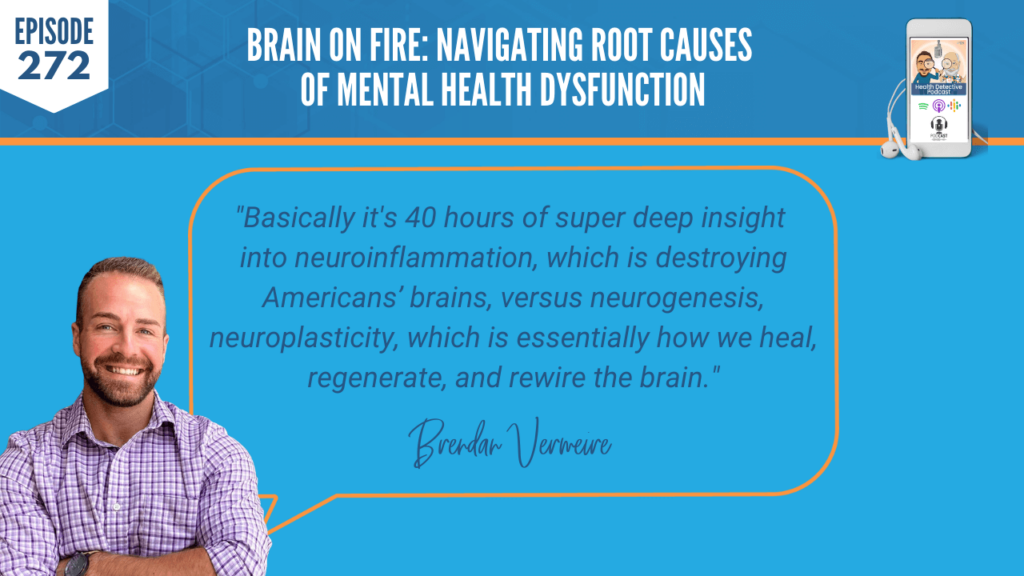
So, we go deep into the underlying neurophysiology of what’s going on there, which is primarily regulated by the glial system of the brain. Basically it’s 40 hours of super deep insight into neuroinflammation, which is destroying Americans’ brains, versus neurogenesis, neuroplasticity, which is essentially how we heal, regenerate, and rewire the brain.
Once we learn that inside and out and what biomarkers we can objectively use to qualify what’s going on there, for example, there is a brand-new biomarker that just became commercially available and it’s a blood-based biomarker that is reflective of brain cell damage. We actually have biomarkers we can pull out of your vein reflective of damage going onto your brain.
Brain on Fire: Modules Three Through Five & Level Two
We have the objective tools to be able to qualify what’s going on here and track progress objectively. Are we moving these biomarkers in the right direction or not? That sets the framework.
And then the rest of the curriculum, it’s module three with methylation and understanding methylation and epigenetics and all the processes related to that. Module four – going deep into the organic acids test and how we employ that. Module five – gut/brain axis, which is probably my favorite subject.
Because in my opinion, when we’re trying to improve the neurophysiology. I always preach mindset, metabolism, microbiome, those are the three big pillars. If somebody is really struggling with their mental health, I would argue that it’s primarily a mindset issue, a metabolic issue, and/or microbiome/gut issue. The gut/brain axis is a huge module.
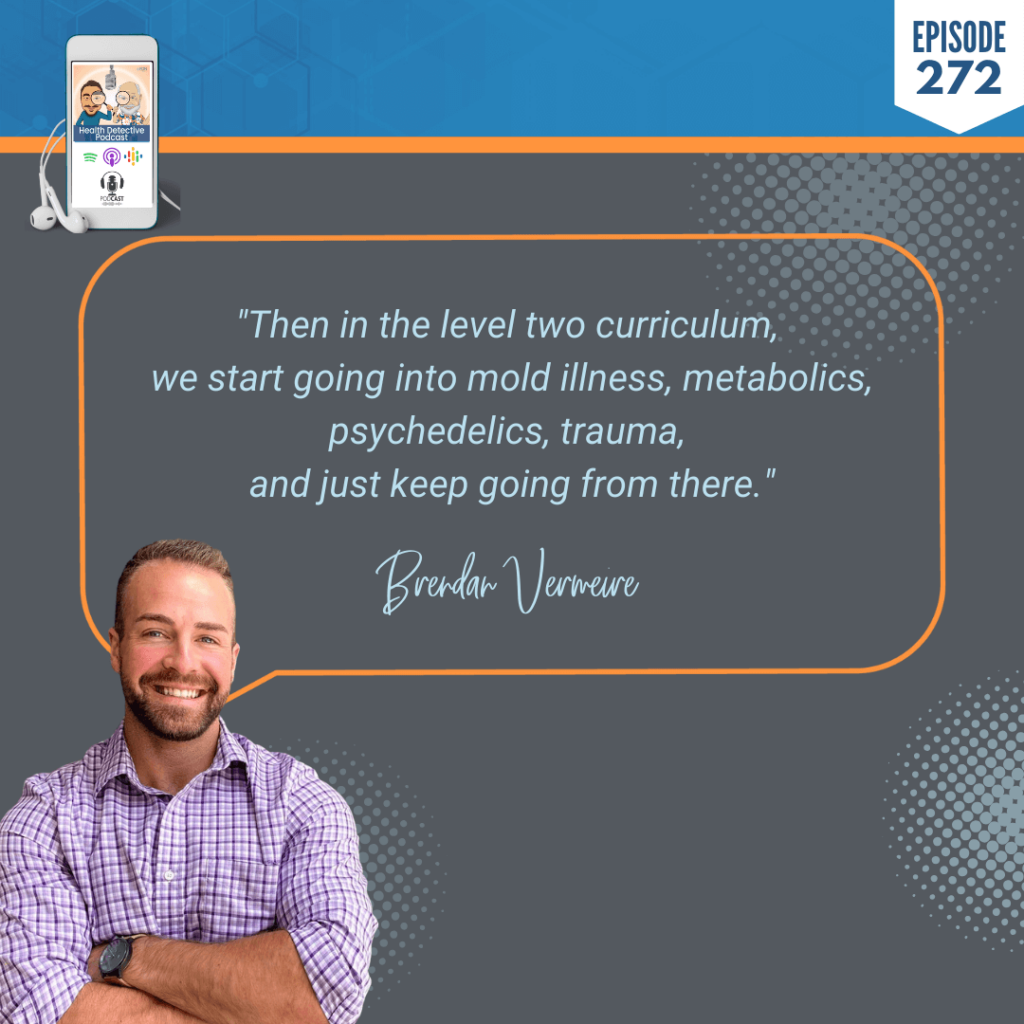
Then in the level two curriculum, we start going into mold illness, metabolics, psychedelics, trauma, and just keep going from there. So, that’s actually the curriculum right there, mapped out module by module.
[00:34:10] Detective Ev: Thank you. I’m glad I asked in a different way, because that’s very exciting, especially just the 40 hours dedicated of that one section. Again, if you know this guy, it’s not surprising. But it’s going to be good. Forty hours with him is 80 to 120 in the average course. You’re getting some bang for your buck there.
Also, I just wanted to say hi. Our friend Ryu’s on. We just started doing the live version of these podcasts. We’ve always done the prerecorded for three years. And Ryu’s been hopping on with us now. He said, “perceptions from beliefs collapse our reality or form it to reinforce their initial belief.” That was just about our comments from before.
Brain on Fire: Nonsteroidal Anti-Inflammatory Drugs
One thing I had to mention specifically with the neuroinflammation. I can’t remember the first person, it actually literally might’ve been your course, when someone posed that idea to me. So, I actually hadn’t heard that before as a legitimate idea, or maybe it was finally getting solidified and it’s something you scroll over on social media. I don’t know. But for the first time I actually thought about that. I’m like okay, that’s interesting.
Then this is where the actual science part can be interesting, guys. Cause there’s a lot of studies out there done that you would have never heard about. And if you try to go find them, you can see some interesting stuff. So, I kept thinking, neuroinflammation. And maybe this was a stupid question at the time, but it turned out to be fruitful. I said, wouldn’t anti-inflammatory drugs then temporarily help mental health issues? And sure, as crap, I go on PubMed, I just type in this stuff. I search for a little while, and I find not only a study, I found a meta-analysis done that showed the temporary efficacy of NSAIDs on anxiety and depression.
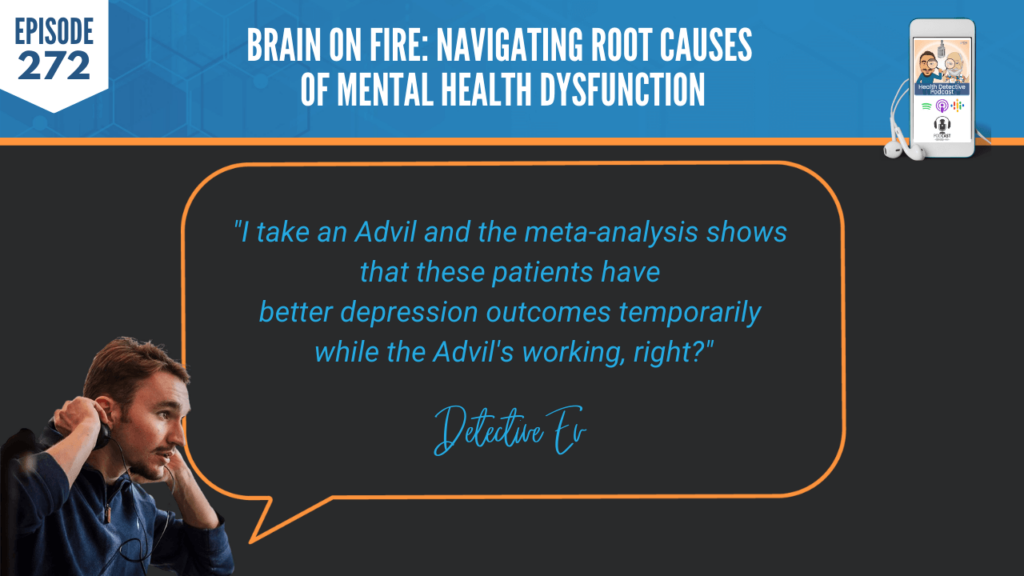
For those that might not understand, NSAIDs are the nonsteroidal anti-inflammatory drugs. Those are like your Advils and stuff. Now, correlation is not causation, but let’s use some common sense. I take an Advil and the meta-analysis shows that these patients have better depression outcomes temporarily while the Advil’s working, right? Huh! I’m not saying that’s definitive, but interesting for this neuroinflammation thing. How fascinating is that?
And then, maybe a little embarrassing, but nonetheless a true part of my story, when I was abusing drugs, when I was younger, I don’t know how to describe this.
Brain on Fire: Making a Connection
This wasn’t something I set out to do, but I used to get headaches a lot when I was younger as well, a bunch of symptoms, right? The whole gamut, you know how it is. This was what I considered recreational; this might sound stupid to some.
But it was like a Friday night, I’m like 15. I’m smoking a bunch of weed and I would take three Advil. Now, no one in the world takes Advil for recreational purposes. But I felt amazing mentally when I smoked weed and took Advil. Knowing what we know, those actually can both be anti-inflammatory in many ways, which is really fascinating. I’m not recommending go do that. Take the course, learn the natural stuff. That might be a little more beneficial than popping three Advil.
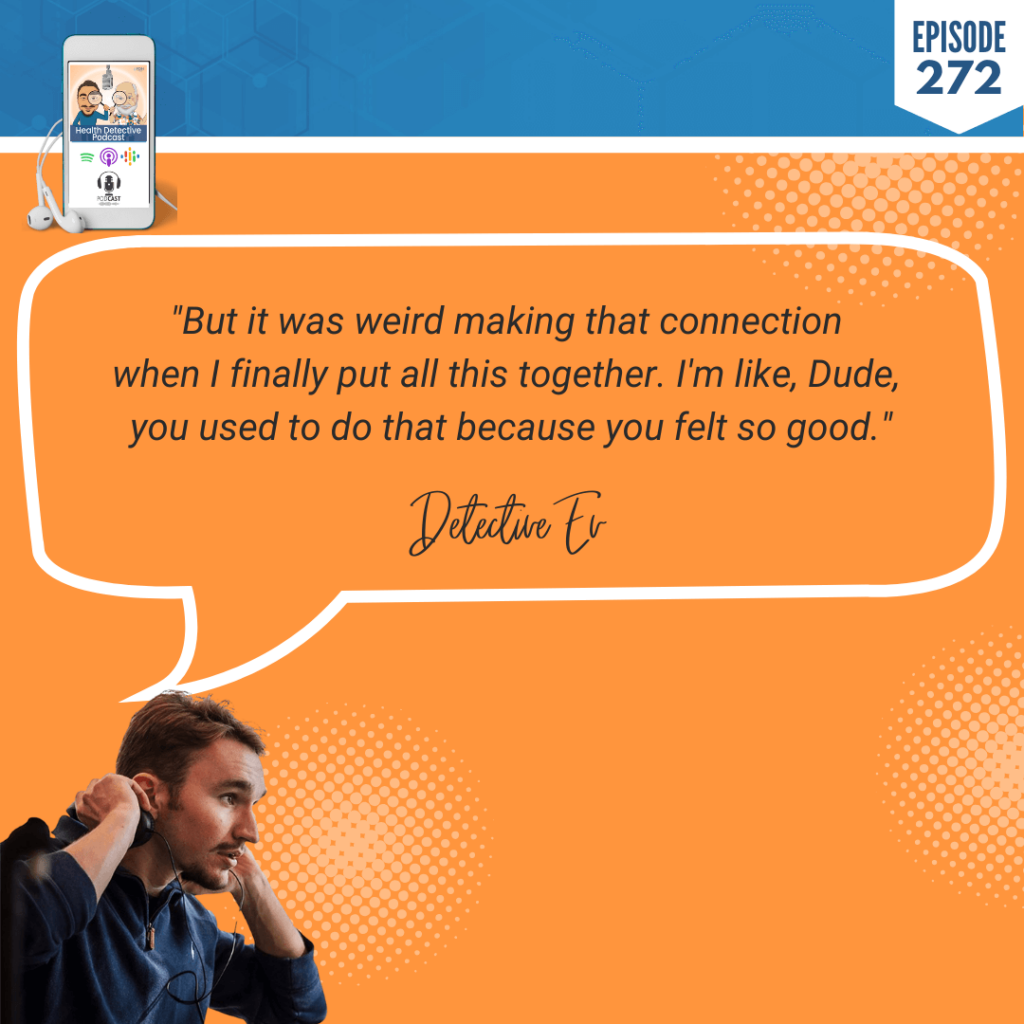
But it was weird making that connection when I finally put all this together. I’m like, Dude, you used to do that because you felt so good. You were a 15-year-old; you had no profound thought about this at the time. But why would an Advil boost your mood? I literally felt better temporarily for the night. So, it’s really cool stuff.
You mentioned already, based on your curriculum, there’s a few things that maybe could be main contributors to the mental health thing. I’m curious if you could break down for us in this relatively short podcast, I know it’s a lot. I defined, at one point, when I’m trying to explain this in a school or something, I define it as non-circumstantial and circumstantial mental health issues. What I mean by that is I let kids know basically that you can be someone like me that didn’t really have any terrible circumstances in my life.
Brain on Fire: The Pharmacological Approach
I didn’t grow up in a mansion, but I grew up with two parents that loved me. It was a good household, man. I had friends at school. Most things were going well. And yet I still had severe health issues, mental health wise. And then my friend, I won’t mention his name, sexual abuse, physical abuse, dad dies. It was bad, right? Now, he also dealt with similar mental health symptoms before he passed away.
When you’re looking at this from a functional perspective, and using my nonclinical definitions of circumstantial and non-circumstantial mental health issues, do both of those things look the same when you look at the biochemistry of the person? Like if it’s a trauma or no trauma, would it still look the same or would they have different profiles?
[00:38:06] Brendan Vermeire: Yeah, it can. It gets pretty complex and messy. But we’ve been sold this narrative for a long time by the pharmaceutical industry that mental illness is the result of brain chemical imbalances. We don’t know why you have the bipolar, the schizophrenia, or the depression, or whatever. We don’t know why it’s heterogeneous in origin, multiple environmental and lifestyle factors seem to be implicated, but just brain chemical balance. You’re lacking serotonergic signaling or dopaminergic signaling or whatever.
So, for many decades, the pharmacological approach was using different synthetic drugs to modulate a lot of different neurotransmitter receptor activities – the selective serotonin reuptake inhibitors or norepinephrine, serotonin, dopamine agonists or antagonists, NMDA with the benzodiazepine, so on and so forth.
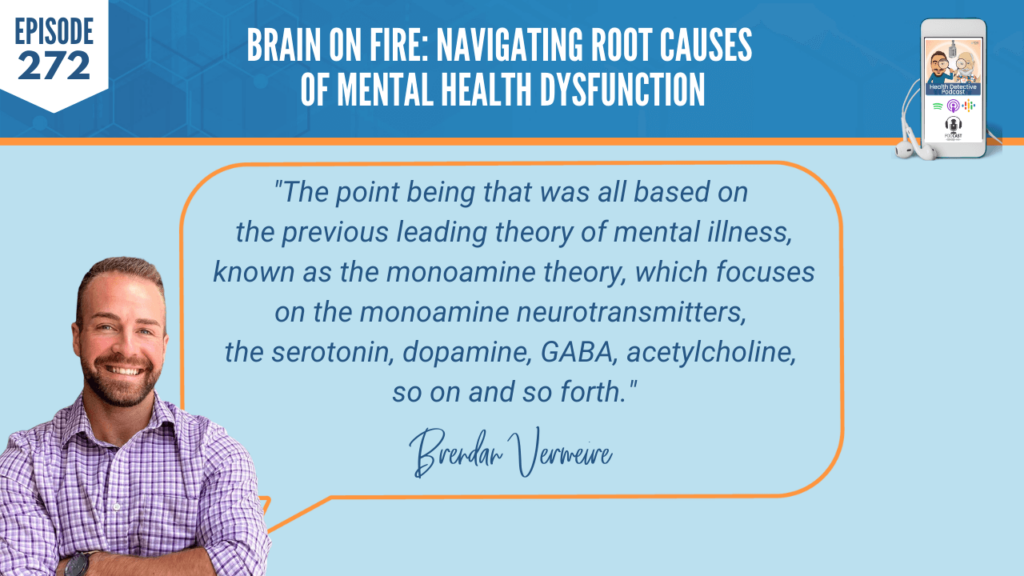
The point being that was all based on the previous leading theory of mental illness, known as the monoamine theory, which focuses on the monoamine neurotransmitters, the serotonin, dopamine, GABA, acetylcholine, so on and so forth.
Brain on Fire: Acute Vs. Chronic
While the monoamine theory hasn’t really been disproven, it’s not the whole picture. Now there’s these other theories that have taken over in the scientific communities. The monoamine theory – the outdated theory – we don’t really go off so much anymore. Now it’s all about the neurotrophic theory and the cytokine theory, which are two sides of the same coin.
The neurotrophic theory is looking at neurotrophic factors, such as brain-derived neurotrophic factor, nerve growth factor. These are different families of proteins that are basically regulating the formation and growth and remodeling of your brain cells themselves. BDNF is very neuroprotective. It’s helping with neurogenesis or the birth of new neurons and how these neurons are wiring and firing together. That’s the neurotrophic model, which is neuroprotective and neurodegenerative.
And then there’s the cytokine/chemokine theory, which focuses on the role that pro and anti-inflammatory cytokines, which are also proteins, are essentially causing the brain to burn up through excitotoxicity and neuroinflammation.
Why I focus so much on the microglial cells is they really regulate both. The analogy I like to use is a forest. A forest could either be thriving and growing – the foliage, the trees, the plants are all growing and proliferating, forming this complex, beautiful green ecosystem. That’s like a brain that’s thriving and growing with all of its neural connections, all of its folds and density as opposed to if there’s an out-of-control forest fire for years and years, the whole forest burns down. That’s neuroinflammation.

So, the question is, what is the balance? We need an occasional acute cleansing fire. If COVID is trying to infect your brain, it’s that cleansing forest fire that burns off the COVID. We need acute neuroinflammation. But it’s the chronic, dysregulated neuroinflammation that has no resolution that causes these issues.
Brain on Fire: The Physiology & the Psychology
With mental illness, there’s a lot of components of the neuro endocrine dysregulation and how all the hormones are changing the way that signals are being transmitted in the brain, which directly ties into the neurotransmitters as well, some more kind of the endocrine, the signaling molecule effect, but then the neurotrophic factors that are actually in charge of protecting and regenerating the tissues of the brain versus the neuro inflammation.
For more of a physiological perspective, those are the major components, but then what makes mental health more complex is that psychoemotional experience and how the thoughts influence the epigenetic expression and the psychological factor as well. At least if we create a framework and we have data points, we can start navigating people a little bit better and objectively qualify them.
Like, do you have neuro inflammation or not? Or rather, it’s not really black and white, you have or you don’t but how much do you have, how often do you have it? For example, you think about a lot of Americans that are chronically inflamed walking around with a C-reactive protein of five. That directly causes leaky brain, activates the glial system, drives neuroinflammation.
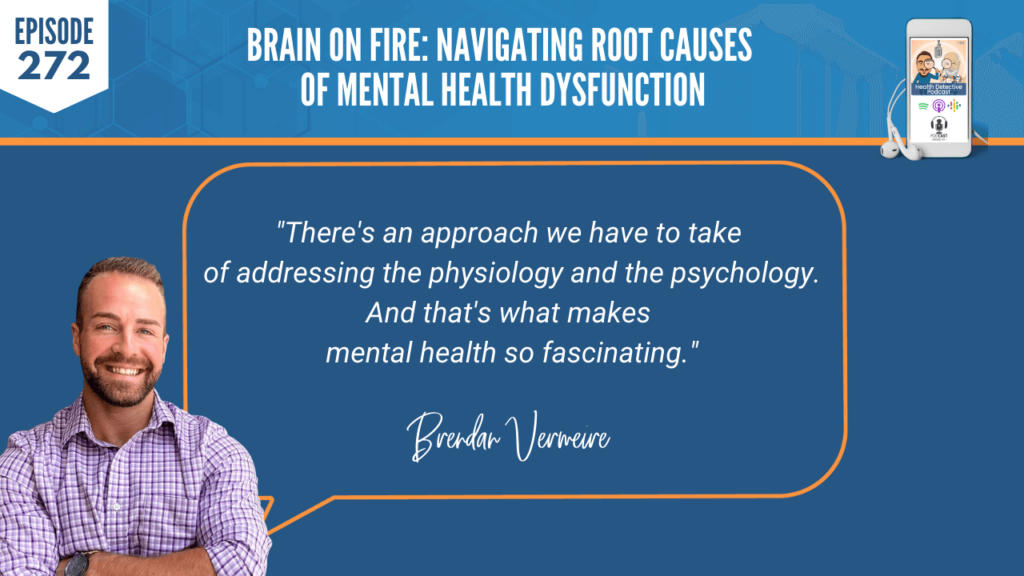
There’s an approach we have to take of addressing the physiology and the psychology. And that’s what makes mental health so fascinating.
[00:42:13] Detective Ev: It is. It sucks that so many people are suffering, but from a purely scientific perspective, it is fascinating. It’s amazing in a sense to me that my friend could have such a uniquely different experience than myself, and yet here we are presenting with dang near at times, identical stuff. It’s like, how can that happen?
Brain on Fire: A Dying Mental Health Stigma
It’s just becoming more open minded to things. At the very least, maybe in a little bit too of aggressive way, but the mental health stigma is clearly dying.
It was crazy going back after, especially the first major round of COVID the first year, it was odd getting to see it with kids. Because adults, we can be mean, but generally speaking, we’ve matured a little bit. We’re a little nicer to people, not always. But there’s a few less bullies as we get older versus high school, for example.
What’s fascinating is the difference in the way people perceived what I was saying, post pandemic versus beginning. Like even the jocks, the people that would screw around in the back, they don’t like it, but they’re being respectful, right? They’re being quiet. They got their arms crossed, yeah, I’ll listen at least. Or maybe they do care and they’re pretending they don’t. So, it’s affecting a lot of people.
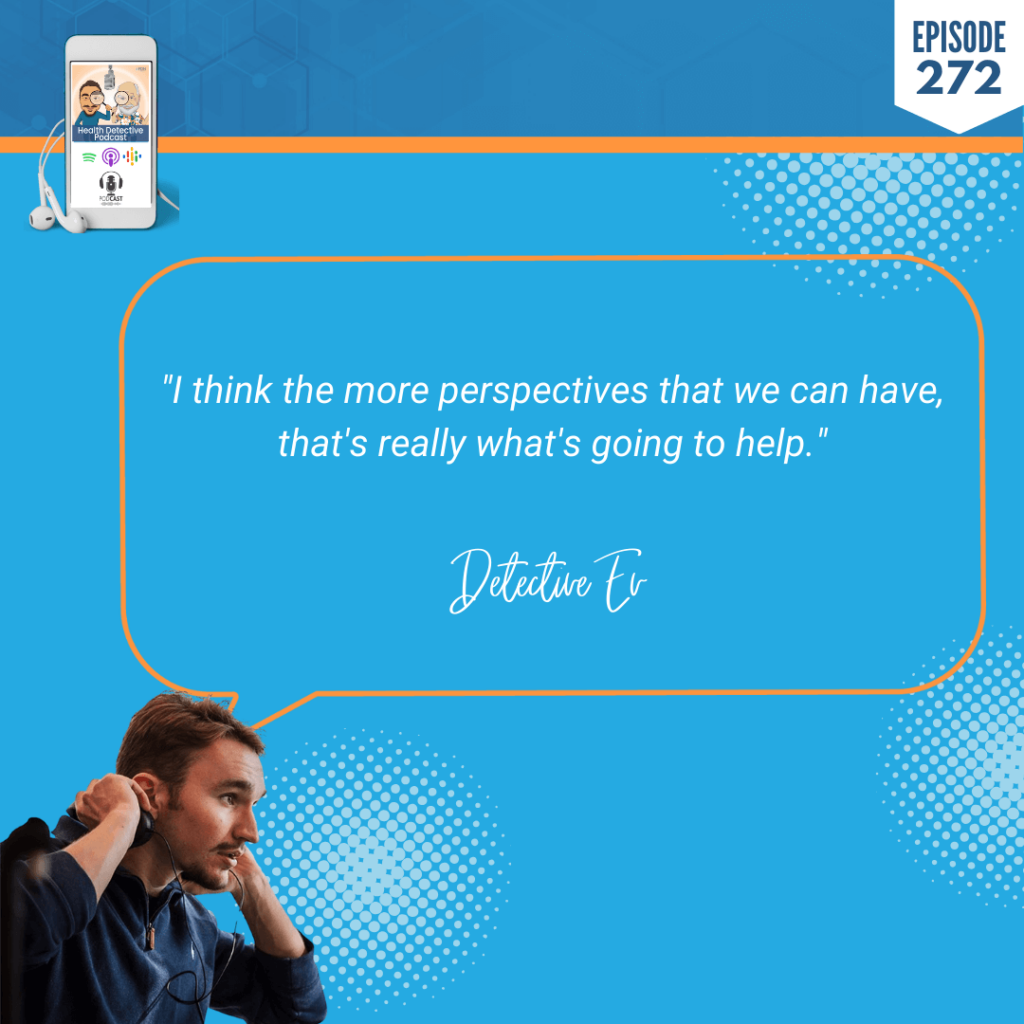
And I think the more perspectives that we can have, that’s really what’s going to help. See the therapist if you have to. Do this kind of technical stuff. I think a mix of all of it would be really good.
I had a client at one time who was on an SNRI. She shared this publicly, so it’s okay. Her name’s Amanda. She basically had her dad pass away in a house fire when she was really young, and she was coming to me almost 10 years later. Now the mental health symptoms started then. She said, Ev, I went to a counselor. My parents had me do all this stuff. I got on the medication. I think I’ve done everything I can here.
Brain on Fire: The Most Scientifically Validated Lab
I was hesitant to take that on. That’s trauma, man. I want to make sure this person’s done what they can in that area, because that’s not me. I don’t know how to deal with that, not well. Then we ran the labs, and sure as crap, there’s a bunch of stuff to work on here.
So, most of these things, I think, end up being very much multifaceted. Because if you have someone like me that didn’t have the trauma, but has the mental health symptoms, the mental health experiences, including the panic attacks, that was traumatic. So, now I have that versus my friend who has the trauma. Do you think his labs are going to look great after he’s been dealing with this for all this time? It all ends up playing together anyway.
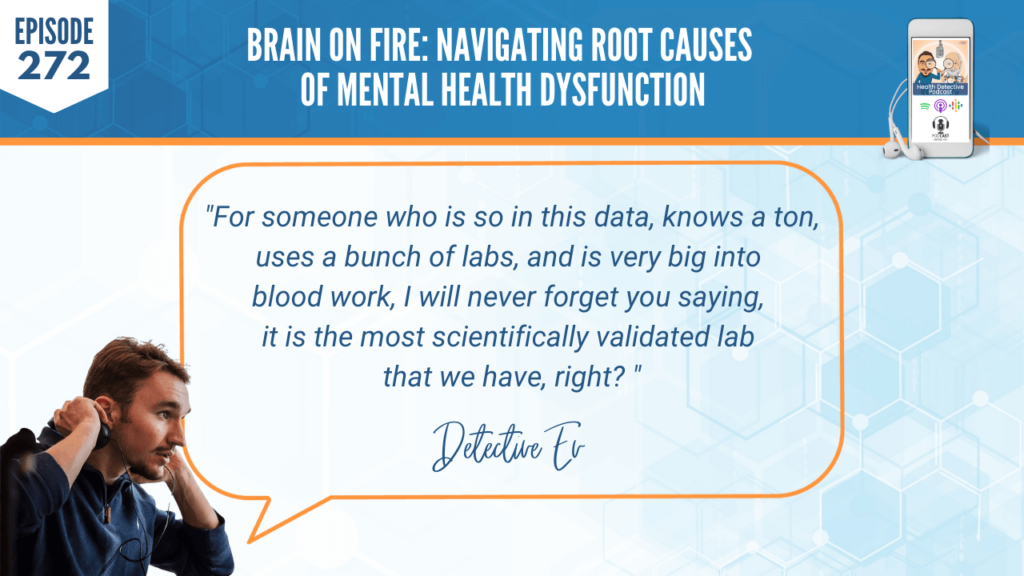
As we wrap up here a little bit, Brendan, obviously we’ll shout out where people can find you. The first thing I got to ask though, is you already talked about a biomarker. I don’t think we ever named it and then you mentioned the C-reactive protein. For someone who is so in this data, knows a ton, uses a bunch of labs, and is very big into blood work, I will never forget you saying, it is the most scientifically validated lab that we have, right? Which I appreciate.
What are maybe a top few markers, if you could narrow it down to that, that you think everyone should really be checking out and making sure is in a good range if they’re struggling with mental health?
[00:44:52] Brendan Vermeire: Absolutely. There’s a lot of them.
Brain on Fire: The Mental M.A.P.™
That’s where studying all the different brain organ axes, whether it’s the gut/brain axis or the liver/brain axis or the kidney/brain axis or the HPA/brain axis, right? There are all these different physiological axes which is why we have to take this root cause approach of assessing their physiology of which systems in your body are compromised because we have to work as close to the source of dysfunction as possible.
Maybe for one person, one of the prime drivers of their mental health issues is more metabolic and glucose dysregulation. So, we have to be looking at their insulin, their glucagon, their blood sugar, hemoglobin A1C, and all that. Somebody else, maybe it’s fatty liver issue. In which case, what are their liver enzymes and serum bile acids doing? Or for other people, it’s a kidney issue or a gut issue.
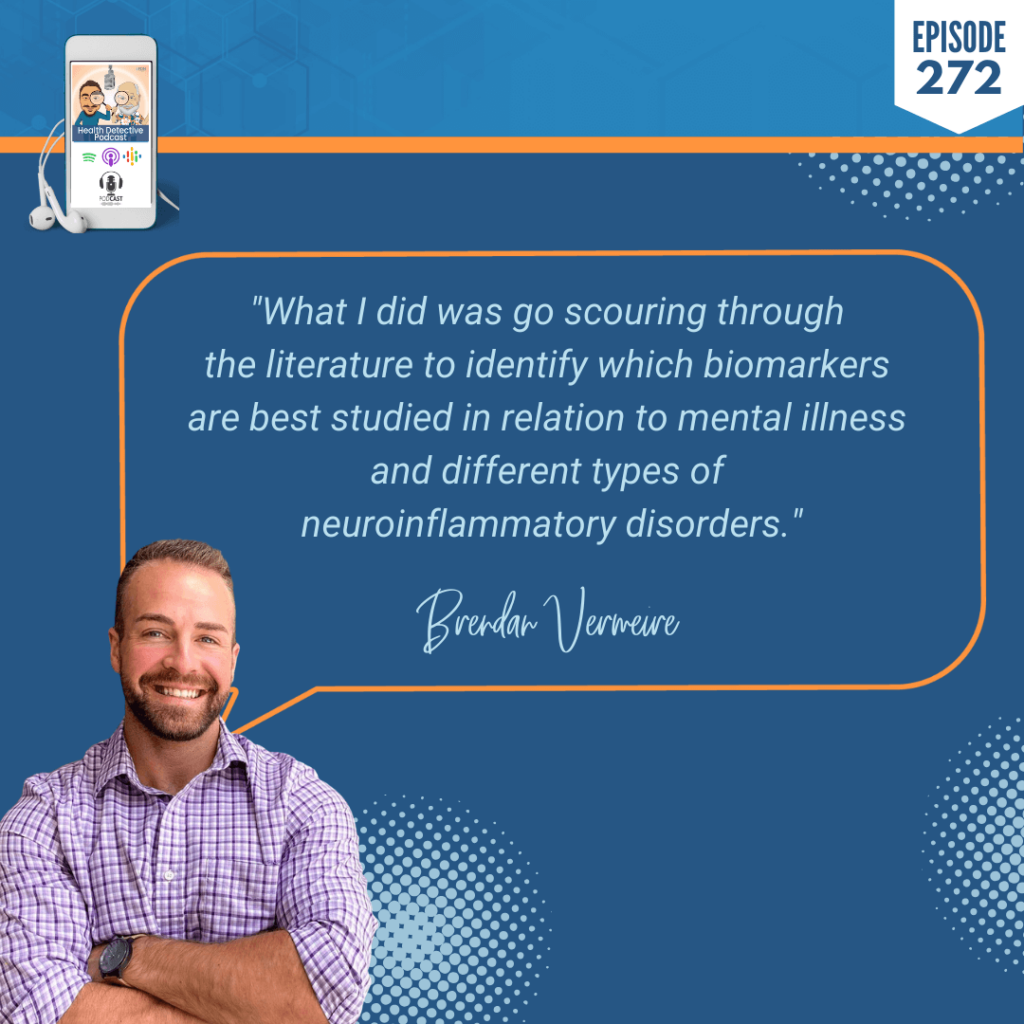
That’s why I created The Mental M.A.P.™. The Mental M.A.P.™, is essentially a proprietary lab panel. M.A.P. stands for micro glial activation profile. What I did was go scouring through the literature to identify which biomarkers are best studied in relation to mental illness and different types of neuroinflammatory disorders.
There’s some that are very common and well known, such as the C-reactive protein. It’s the best studied inflammatory biomarker on the planet. And yes, it is heavily implicated in virtually every mental health disorder and or degenerative condition known.
Then some of these more novel biomarkers, like I was mentioning before, Neurofilament light chain. It’s essentially a protein filament that’s released by damaged neurons that we’re measuring in the blood. It’s a direct marker of neuronal damage. So, if somebody has more neuro inflammation or TBI or concussion and more neuron damage, they’re going to have higher levels of this protein filament floating around in blood.
Where to Find Brendan Vermeire
Then there’s other things like homocysteine, for example, which is typically thought of as more of a cardiovascular prognostic marker because it drives endothelial dysfunction and atherosclerosis. But it also is an NMDA receptor agonist, so it can actually drive leaky brain and activate glial cells and drive this excitotoxic response in the brain.
We typically, in the functional world, think of it as a methylation marker. So, that’s the thing, there’s so many different biomarkers that, while not necessarily always specific to mental health, are very much implicated in a variety of mental health pathologies.
[00:47:08] Detective Ev: Awesome, thank you. We’ll have where everyone can find your stuff. Just to say it verbally, where can they find you, where can they learn about The Mental M.A.P.™? Then, where can they sign up for your program, if they’d like to do it? Give us all that.
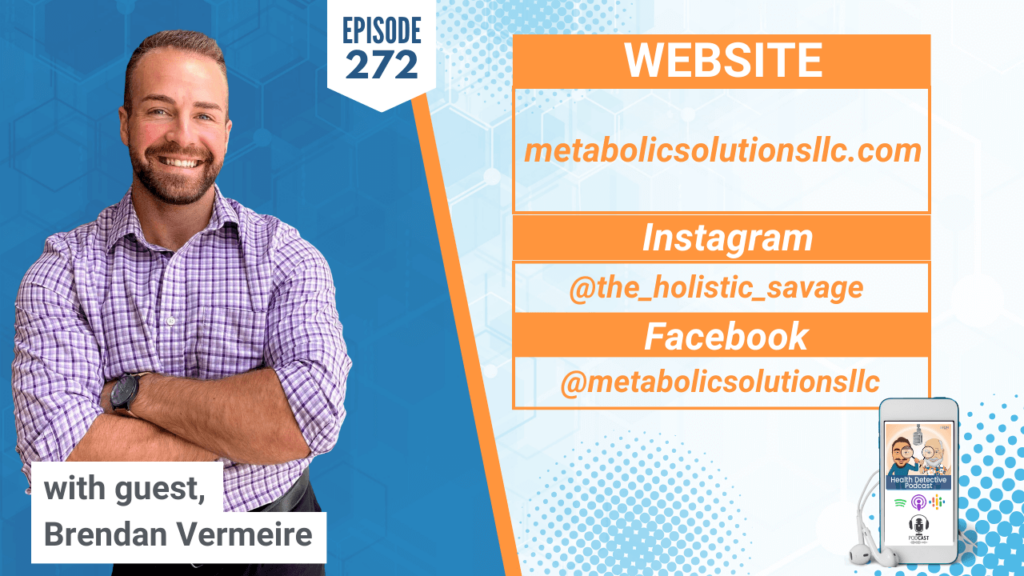
[00:47:17] Brendan Vermeire: Website is metabolicsolutionsllc.com. Just on the homepage, we’ve got all the main links that you can get to wherever you’re trying to get to. And then my main social media platform is the_holistic_savage on Instagram, which, that’s just my main platform to communicate with the world. I put out a lot of good content on there. I’m not too hard to find.
[00:47:36] Detective Ev: Sweet. Then the signature question to finish this up. And man, with you, this could be a lot. I feel because you love the science, but you also understand that some of the foundational simplest stuff is the best things that we can do, I might not be too surprised by your answer. We’ll see.
Signature Podcast Question
The signature question is, if I gave you a magic wand and you could wave it and get every single person in this world to either start doing one thing for their health or you could get them to stop doing one thing, it’s one or the other, what is the one thing that Brendan Vermeire would get them to do?
[00:48:01] Brendan Vermeire: Honestly, I’m going to say going for a walk in nature almost every day.
It’s funny. Being like a fitness junkie, I have my fitness, my nutrition, my lifestyle regimen, my girlfriend says I’m like highly neurotic. Which I don’t see it that way. I think I’m obsessive, I’m passionate, I’m regimented.
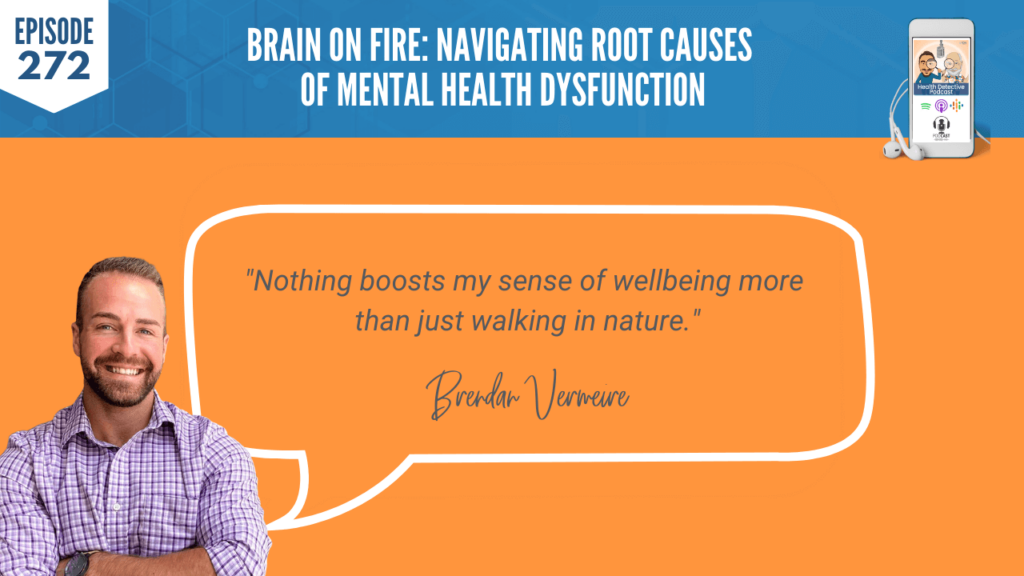
Honestly, I think about my weightlifting or my yoga or my nutrition or sleep is sacred. I cannot function, nothing crashes my mental health more than not good sleep. But nothing boosts my sense of wellbeing more than just walking in nature. Even after this podcast, I’m about to go for a nature walk and reconnect with the planet, nature, sunlight, pseudocommensal exposure. So, walking in nature.
[00:48:50] Detective Ev: I usually don’t comment after that, but I do love that.
I don’t have regrets really. And this is such a funny regret to have. So, I wish I knew this when I was depressed because I love hiking now. Man, I never got out of my house, I never fricking left. I went where I had to go for a second, did some drugs, came back. That was it.
I want to know what would Evan Transue be feeling like if it was my most depressed day and I just walked out on the hiking trail and actually started doing that? Would it be possible to feel that same level of depression?
Conclusion
Now everyone’s experience is unique. I’m not saying it’s that simple. I just say, I want to know for myself. So, I wish I could go back solely for that reason. I’ve said this a million times, I just want to know would I feel this way cause I can’t buy it. I feel so different when I’m out there that I can’t buy it.
And then it begs an even bigger question for the next podcast. Isn’t that what we’re supposed to be doing every day anyway? Tune in next time for the Health Detective Podcast. Na, I’m just kidding.
Thank you so much, Brendan. This was great, brother.
[00:49:40] Brendan Vermeire: No, thank you, my friend. It was truly a pleasure.
You can always visit us at functionaldiagnosticnutrition.com, on YouTube @FDNtraining, on Instagram @fdntraining, or on Facebook @FunctionalDiagnosticNutrition.
For more informational and functional health-oriented podcasts like this one, go to functionaldiagnosticnutrition.com/health-detective-podcast/.
To learn more about us, go to functionaldiagnosticnutrition.com/about-fdn-functional-testing/.

